#he has systematically destroyed every loved one and every ally
Text
theyre obviously drawing parallels of the wittebane brothers with hunter and luz, but hopefully with less fratricide. so what if it actually gets acknowledged in canon?
when they run into him, belos sees the echo of his brother with a younger human peer. they’re taking care of each other and gallivanting around in masks, having adventures like phillip and caleb used to. before they got to the demon realm and everything fell apart. before caleb fell in with the witches and phillip took the CLEARLY righteous path and rejected that world.
except luz and hunter have already been in the demon realm. luz has taken the magic and the culture of the isles and flourished. despite all of belos’s efforts, hunter has also studied wild magic and even ultimately betrayed him like caleb did. and now instead of convincing hunter to return to puritan sensibilities in the human world like belos wanted to do for caleb long ago, luz has converted them both to heretics. and their relationship is better for it.
but belos will never admit that the problem was himself. that if he had embraced the boiling isles, or even just tolerated his brother’s embrace of it, then he wouldn’t have “had” to kill caleb. so instead he looks on with envy at luz and hunter, who could have been phillip and caleb in another life but achieved this while doing everything wrong, and rages.
#toh#the owl house#luz noceda#hunter toh#phillip wittebane#caleb wittebane#emperor belos#the owl house season 3#thanks to them#uuuuuuoooooooggggghhhhhhhhhhuuuuuuuueeeeeeee belos is such a good villain#bro is living out a century spanning greek tragedy in old americana#luz and hunter are phillip and caleb but better#he has systematically destroyed every loved one and every ally#and he will never admit to his own wrongdoings out of the intrinsic flaw to his character#but deep down he knows its his own fault#and instead of acknowledging it and reflecting on it he just keeps destroying#luz and hunter are siblings
855 notes
·
View notes
Note
but if u say something mean about jtodd i will love you
that is such an amazing point anon ty
one of my (many) issues with jtodd is that popular fan interpretations ignore the actual, intentional tragedy of his character in order to massacre every other character in his orbit.
jtodd isn’t welcomed back into the fold by bruce or dick or tim or anyone else because of his own actions — he rejects the chance to return, and pursues his own idea of violent retribution instead. he can’t return because he himself has burnt that bridge. that is the nature of that kind of profound grief, you often self immolate because there is no other way to keep urself warm.
the tragedy is that yeah, jason does casually want to interact with his family (re outsiders, parts of utrh + batman 2009) but he can’t — because of what he’s done. he still respects dick and babs, but he’s irreversibly destroyed any properly trusting relationship that could’ve been rebuilt. he still loves bruce (and try as he might he just can’t stop) but bruce will never trust him around his allies again, because he broke bruce’s cardinal rule to spite bruce.
not only that, he used what he’d learnt as robin, the allies he’d gained through that legacy, and systematically uses that knowledge to cause harm. how could that ever be reconciled? how can anyone seriously ally themselves with that sort of person?
by comparison, fanon turns him into someone with no agency (pit madness), someone who is reviled unfairly (despite being a murderer), or someone who is beloved by those who would never justify his bad decisions (any of the other robins, cass, roy, etc) to the detriment of their own characterisation.
JTODD IS A TRAGEDY OF HIS OWN MAKING ! YOU CAN NEVER RETURN TO WHAT YOU ONCE WERE ! THE ONLY WAY OUT IS THROUGH !
617 notes
·
View notes
Note
Hello. I have seen your Merlin crit posts and they seemed to be really interesting. However, I wanted to ask your opinion about something in the show (not anything political or such)
What is your opinion on the fact that in s5, the friendships Merlin had in the previous seasons with Gwen and the Knights are non - existent? Who do you think would be capable of helping Merlin during the season, apart from Gaius and Killgarah (he was mostly useless but still)?
What is your opinion on the episode "Lesson in Vengeance"?
@fanficwritinggremlin
At s5x07, merlin is running on fumes and is directionless.
See s5x05: The Disir
MERLIN
It won't always be like this. One day we will live in freedom again.
MORDRED
(looks up hopefully)
You really believe that?
MERLIN
I do.
He has A Political Goal which is "one day we will live in freedom again" but still has no idea of the following:
(1) how to get there:
(2) what it actually looks like.
-->By s5 Merlin still has no concrete plans nor timeline and no step-by-step agenda to achieve his Political Goal™
And due to various previous circumstances, he had been cut off socially (or by rank/class), emotionally, psychologically and physically from everyone who used to genuinely care about him or want to see him at his best.
Now... how is someone else supposed to help the dude:
who have been conditioned in the past 8 to 10 years that he alone could fix thirty years of worth of genocide, the propaganda surrounding the genocide and its far-reaching side-effects?
who've had everyone he loved dead because they protected him or he have had to sacrifice them (without their knowledge) for the greater good?
who even now, never tries to negotiate properly with his opponents on equal and honest terms?
who has lied to the state repeatedly and thus destabilized it from the inside because of his withholding of important state secrets?
..........................
The only thing Merlin had left was a real show/display of his own power in public. A magic reveal.
why?
because Merlin does not have any real court power. He was never advanced socially in rank by his sovereign bosses. He has no true allies who can actually help him get near his Political Goal.
Merlin really really needs to have political power if he wanted his Political Goal to be achieved. Since his sovereign king and queen never gave that to him, at season 5, then he needed to show why he deserves some.
Therefore at s5x07 the only one who can actually and efficiently help him is himself.
.....................
Consider his narrative equal and foil, Morgana.
What they both have in s5x07
advanced use of magic
dragons
fortified kingdoms under their control
justification
What Morgana had that Merlin didn't have
name, reknown, fame, a political kind of "brand"
support of almost all armed non-magic and magic factions and entities that want to destroy camelot
legitimate claim to the throne
money, machinery and people after 1-2 years of regaining everything from scratch
What Merlin had that Morgana did not have
just some vital pieces of information.
support of a dwindling indigenous faction who will never take up arms
You see what I mean? Morgana had allies, strong allies, who helped her plan her strategies and support these plans at every aspect. This is because they knew her and they trusted what she could do. And she got to trust them too.
Morgana did her best to gain as many allies as she could through any means, because Morgana knew she could never overthrow Camelot on her own.
Merlin had none. Even in his relatively safe location inside Camelot, he never built a network of other entities who can actually support him. Gaius kept forbidding him to reach out to others. Kilgharrah advised against it many times. Merlin was made to believe that fixing everything thru only his own power and alone was the best way to do things.
That's why Morgana was perfect foil to him. She had huge political influence and power. Moreover, she was systematic and delegated a lot of revolutionary/rebellion tasks and activities to her allies. They were empowered and did well because she rewarded them too.
Merlin had a lot of advantages as her but Merlin's indoctrination and training did not allow for him branch out and step into a prime political position just like Morgana did. He took the lone wolf path too far and was surprised when over time, nobody in Camelot was truly left in total support for him.
......................
The bottomline is... Merlin reveals himself -> he gains much needed political power and court influence -> he is closer to his Political Goal.
............
addendum you might ask: what if arthur executes him??
-> that's merlin's problem for being so treasonous in the first place. if he's really destined to become the most powerful warlock kingmaker and advisor, then he can talk and live through any threat arthur would give him.
#bbc merlin#mergana#bbc guinevere#bbc morgana#bbc arthur#merlin crit#thots#its an extremist vs extremist game#wars of truth and privilege who would win#kingmaker merlin#you have no idea how challenging this was to articulate#added note: pls read any of monmouth up to malory if possible#if u know the merlins in those texts then you will understand why i reply like this#also merlin bbc is an inherently political show#coz we're talking kings and successsions even you cant be caught unaware -lion king
2 notes
·
View notes
Photo



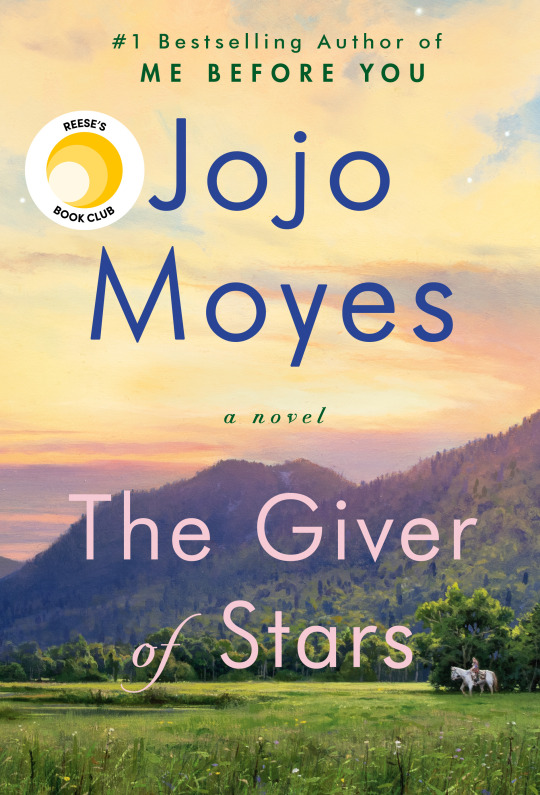
National Library Lovers Month: Fiction
The Midnight Library by Matt Haig
Somewhere out beyond the edge of the universe there is a library that contains an infinite number of books, each one the story of another reality. One tells the story of your life as it is, along with another book for the other life you could have lived if you had made a different choice at any point in your life. While we all wonder how our lives might have been, what if you had the chance to go to the library and see for yourself? Would any of these other lives truly be better?
In The Midnight Library, Matt Haig's enchanting blockbuster novel, Nora Seed finds herself faced with this decision. Faced with the possibility of changing her life for a new one, following a different career, undoing old breakups, realizing her dreams of becoming a glaciologist; she must search within herself as she travels through the Midnight Library to decide what is truly fulfilling in life, and what makes it worth living in the first place.
The Paris Library by Janet Skeslien Charles
Paris, 1939: Young and ambitious Odile Souchet seems to have the perfect life with her handsome police officer beau and a dream job at the American Library in Paris. When the Nazis march into the city, Odile stands to lose everything she holds dear, including her beloved library. Together with her fellow librarians, Odile joins the Resistance with the best weapons she has: books. But when the war finally ends, instead of freedom, Odile tastes the bitter sting of unspeakable betrayal.
Montana, 1983: Lily is a lonely teenager looking for adventure in small-town Montana. Her interest is piqued by her solitary, elderly neighbor. As Lily uncovers more about her neighbor’s mysterious past, she finds that they share a love of language, the same longings, and the same intense jealousy, never suspecting that a dark secret from the past connects them.
The Shadow of the Wind by Carlos Ruiz Zafón
Barcelona, 1945 - just after the war, a great world city lies in shadow, nursing its wounds, and a boy named Daniel awakes on his eleventh birthday to find that he can no longer remember his mother’s face. To console his only child, Daniel’s widowed father, an antiquarian book dealer, initiates him into the secret of the Cemetery of Forgotten Books, a library tended by Barcelona’s guild of rare-book dealers as a repository for books forgotten by the world, waiting for someone who will care about them again. Daniel’s father coaxes him to choose a volume from the spiraling labyrinth of shelves, one that, it is said, will have a special meaning for him. And Daniel so loves the novel he selects, The Shadow of the Wind by one Julian Carax, that he sets out to find the rest of Carax’s work. To his shock, he discovers that someone has been systematically destroying every copy of every book this author has written. In fact, he may have the last one in existence. Before Daniel knows it his seemingly innocent quest has opened a door into one of Barcelona’s darkest secrets, an epic story of murder, magic, madness and doomed love. And before long he realizes that if he doesn’t find out the truth about Julian Carax, he and those closest to him will suffer horribly.
This is the first volume of the “The Cemetery of Forgotten Books” series.
The Giver of Stars by Jojo Moyes
Alice Wright marries handsome American Bennett Van Cleve, hoping to escape her stifling life in England. But small-town Kentucky quickly proves equally claustrophobic, especially living alongside her overbearing father-in-law. So when a call goes out for a team of women to deliver books as part of Eleanor Roosevelt’s new traveling library, Alice signs on enthusiastically. The leader, and soon Alice's greatest ally, is Margery, a smart-talking, self-sufficient woman who's never asked a man's permission for anything. They will be joined by three other singular women who become known as the Packhorse Librarians of Kentucky.
What happens to them - and to the men they love - becomes an unforgettable drama of loyalty, justice, humanity, and passion. These heroic women refuse to be cowed by men or by convention. And though they face all kinds of dangers in a landscape that is at times breathtakingly beautiful, at others brutal, they’re committed to their job: bringing books to people who have never had any, arming them with facts that will change their lives.
#national library lovers month#libraries#fiction#library books#books & libraries#book recommendations#reading recommendations#book recs#reading recs#TBR pile#tbr#to read#booklr#book tumblr#book blog#library blog
2 notes
·
View notes
Text
I was thinking about it while I was in the shower, so here’s another Hot Take on the discussion on whether we can (or should) consider technoblade as abusive
a lot of interactions between technoblade and other characters are difficult to gauge because c!techno obviously isn’t honest about his feelings at all times On Top Of cc!techno Very Rarely If Ever being completely in character, including and especially with very serious lore scenes. so how we’re meant to take anything he does or says is hard to parse, especially with the knowledge that other creators can take scenes seriously and incorporate it into their lore even if it wasn’t the intention at the time (like jack’s death at tommy’s hands during exile).
(technoblade has only recently come out to state that he’s intentionally playing his side of the story lighter to give people a break from the heavy angst in the rest of the server, but that’s hardly new. he broke the tension all the time during his partnership with tommy, namely with the confrontation with dream at the portal and tommy and tubbo’s first reunion, but it was even noticeable with doomsday, his perspective is a Palpably different tone from Anyone on the l’manberg side of things. which can make some Very interesting inconsistencies when it’s directly slammed into tommy’s more serious roleplaying style.)
you can Easily read him as Either a purely opportunistic character who uses the guise of being deeply emotionally wounded as a justification for Horrific Violence when he was never that emotionally invested in the first place Or a character that is rarely if ever honest and open with his feelings, who hurts other people by accident by trying to downplay his own vulnerability who is Nevertheless deeply emotionally invested in and impacted by the people around him. both interpretations can be soundly backed up by what we’ve been given and we can’t really discount the other reading because of the semi-canoncity of whatever technoblade does. we aren’t really gonna know unless technoblade himself decides to address it specifically.
so with that in mind, I want to take a second to take a more charitable reading, not as an argument that technoblade’s relationship with tommy Wasn’t unhealthy (because it objectively was no matter the reading of his intentions) but to ground the overall conversation a little bit here.
this, I think, is where the nuance in the intersection between “technoblade didn’t have the full picture of what happened with dream and tommy” and “technoblade knew enough to know that what he did on doomsday was wrong” Matters.
if we read technoblade as a character that genuinely cares but either chooses not to or doesn’t know How to express those emotions in a healthy productive way (“tsundereblade” ala the scene of ranboo giving techno the axe) Combined With techno’s very dry sense of humor then it Is very possible to read some of the more uh, Unfortunate things that he’s said in a different light. which doesn’t excuse them by any means, people hurting their friends by not being emotionally honest or through jokes that hit harder than intended happens all the time and it’s the responsibility of that friend to apologize and change their behavior. but at the same time, people can’t actually change their behavior if they don’t know that what they’ve done is wrong.
we need to keep in mind that:
- both technoblade And tommy express their affection with their friends by ribbing them. making fun of each other Is a sign of affection for them. if we’re meant to read that as part of their characters then it may not be entirely fair to say that technoblade should’ve known that putting tommy down was going to hurt him
- technoblade knows (or assumes) that dream wants to kill tommy and he knows that tommy has trauma. but technoblade Doesn’t know that dream systematically destroyed tommy’s self confidence to the point of being suicidal. he Doesn’t know how fragile tommy is about his own self worth, and he Doesn’t know that that kind of joking would hit tommy differently now than it would’ve back during their pogtopia days.
- technoblade knows that tommy was a child soldier, he knows that he was forced out of his home and isolated by someone that he’d trusted and loved, and he directly relates tommy’s betrayal to his own. he’s more likely to think that tommy’s mental state Now has more to do with l’manberg than dream specifically even if he recognizes dream as a threat to tommy.
none of this makes techno putting down tommy’s self worth Right, it doesn’t mean that we have to look at him charitably when he tells someone to their face that they aren’t equals only to turn around and destroy a country when he thinks he’s being dehumanized. but I also think that we can’t necessarily assume that he 100% devalued tommy both as a person and a friend from that interaction.
moreover, technoblade was For Sure being opportunistic in trying to recruit tommy. I’ve made my own analysis on techno obviously trying to prime tommy for a partnership at the start of tommy’s exile. but at the same time, I don’t think that’s necessarily Solely about taking advantage of what tommy could do for him, especially since he was trying to recruit tommy before he’d had his mind set on actively destroying l’manberg.
assuming that technoblade was as hurt by tommy as he was because he genuinely Cared about tommy, because he and tommy Were friends and he enjoyed his company, then he very well could’ve recognized that tommy being betrayed by the same people he was would open him up to being able to relate to him. techno and tommy have very fun interactions when there’s nothing driving them against each other, but they’re fundamentally incompatible on their morality and philosophies.
so the obvious solution to that would be one showing the other that their way of thinking was wrong, to let their relationship thrive without that barrier between them. and like, obviously technoblade is the extremist of the situation, it’s a little hard to swallow him trying to change tommy when he’s the one that refuses to compromise even when tommy tries to do it for him. but I think it’s worth recognizing when we’re having a conversation about whether or not he Solely saw tommy as an asset to use rather than a companion. if you choose to read techno as someone who refuses to compromise on his ideals but craves that interaction anyways, then the way he scooped tommy up while trying to relate tommy’s situation to his own, trying to convince them that l’manberg was bad for him, etc, can be read in a Much Less overtly malicious light. it’s still not a Healthy one, but at least it’s not Child Labor Meat Shield.
this particular reading Does have the fact that techno didn’t try to recruit anyone else on its side. for the entirety of tommy’s exile up until doomsday he didn’t try to seek out partnerships with anyone, even though there were Several people unaffiliated with l’manberg at the time. he sought tommy out the First Day of his exile, surely the moment he heard of it, and he was Noticeably Eager to partner with him the moment he’d found him in his house. if that was nothing but pure unadulterated ambition and opportunity seeking then you’d think he’d try to make at least One ally in the meantime.
then again, tommy was the most vulnerable person on the server at the time, you don’t have to know about tommy’s abuse to know that. if you choose to read techno as solely opportunistic then it’s easy to dismiss all of that and say that techno went for tommy because he saw it as the safest bet and that he didn’t gun for any other allies before him because he didn’t see it as immediately necessary until he’d been provoked. but on the other hand, it makes a lot of Sense that a character who’d just cut himself off from every ally he could’ve had but One would be kind of desperate for any chance at connection that he could get. that he’d seize the opportunity specifically Because he enjoyed his relationship with tommy before it went south and he wants to have a close partnership like that again.
technoblade’s a highly paranoid character, so you could argue that he’d try to seek out any partnership he could get his hands on if he was truly actively gunning for allies to the point of being willing to overlook his grudge against tommy to scoop him up as soon as possible. but on the other hand, technoblade’s a highly paranoid character, so he might not want to Risk someone ratting him out to the enemy if he can’t trust them or if they aren’t as neutral as they seem to be.
so ! with all that in mind I think that it’s a valid take to argue that technoblade’s actions could’ve been considered abusive whether he realized it or not, but I also think that it’s a valid take to say that it might not’ve been the intention of the roleplayers at the time and that some of the details that can be used to come to the conclusion that technoblade was abusive were tinged by cc!techno’s humor and him not thinking through the implications of tommy’s current arc. both takes make sense within the context of what we’ve been presented, we just need to make the space for both within overall analysis.
#dream smp#technoblade#tommyinnit#technoblade critical#c!technoblade critical#meta#long post#don't neg me about not putting this in the main tag it will not stop me#every time someone pulls that I add the main character tag more confidently
437 notes
·
View notes
Photo


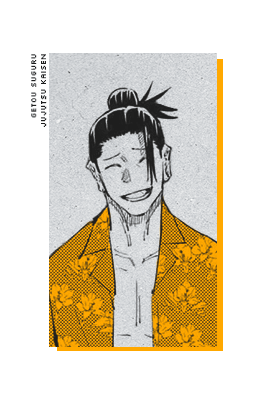
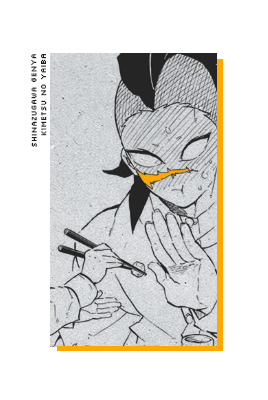
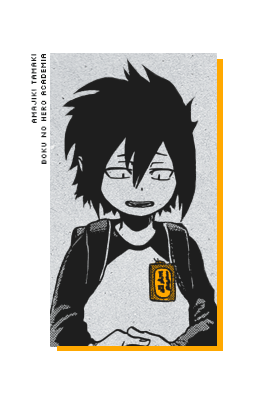



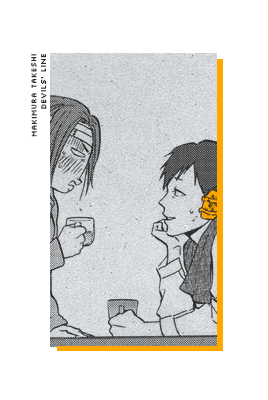
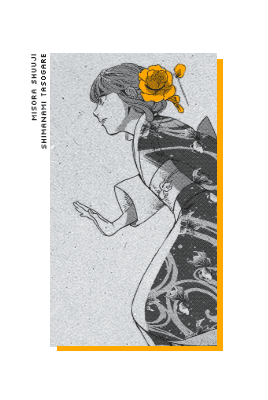
top ten tagged by @linkspooky 🍊
explanations under the cut! sorry for rambling xo
→ rules: name your top ten favourite characters from ten different fandoms, and then tag ten people - @osomanga @kara-suno @anonimarevolts @zeninmaki @wildbishonen @shysheeperz @tkmewthyou @kaldurlenn @joxterism @marshmallowdonutsprinkles
snufkin okay so he’s the only one not from an anime or manga but i had to put him on bc he’s the most important fictional character to me, ever. i grew up watching the moomin cartoons in the 90s and thinking about it instantly calms me down - they used to air the episodes early in the morning when it would still be dark outside: the landscapes were moody and cosy, the characters were so softly spoken and articulate... it’s just peak nostalgia.
anyway, snufkin is moomin’s best friend; he returns to moominvalley every year to be with his friends during the spring and says his goodbyes to go adventure again come winter. it upsets moomin when he leaves but snufkin is adamant that quiet and solitude are important and healthy, and it’s not fair to expect him to compromise on his independence - that made a really big impact on me as a kid, especially as someone who never really had their ‘own’ space (twinsies). relationships aren’t weakened by physical distance or time, they’re about communication and understanding. that was important too.
i don’t think i realised just how influential it had been until i was an adult but snufkin is an anarchist. he first shows up in the comics when moomin and sniff are talking about opening a bank - he tells them they should plant fruit trees instead. he destroys private property and rescues orphans, he refuses to participate in things that don’t bring him joy. when he’s asked where home is, he replies, “nowhere. or everywhere! it depends how you look at it” - the whole world belongs to him, and the whole world belongs to everyone else too.
yomo renji in general, i like characters that trudge along in the background and do the nitty-gritty work that supports the main story. i like people like that irl too. more than anything else, yomo is desperate to form human connections, even though he’s shackled by self-doubt and self-loathing. he just wants to positively contribute to a community, thinking he’s most useful keeping a quiet eye on people who might need protection/guidance (while still giving them space to grow and act themselves) or foraging for human corpses so that others aren’t in danger or moral anguish doing it for themselves.
bird boy is a total weapon - “the perfect ghoul” - and you’re reminded over and over again but a lot of his growth is about rejecting violence and repurposing his power as something productive that he can use to help the people around him instead of hurting people (the yang to uta’s yin). in the first few chapters, he says he kills humans (he’s a ghoul, humans are food, it’s natural) and yet he’s consistently framed as a scavenger who seeks out ‘roadkill’ [suicide victims] for sustenance, even before coming to anteiku, and implements a system so other people can do the same.
suguru getou i was originally gonna say meg bc i love him but, having just finished The Flashback Arc, i can’t stop thinking about getou and i’m beyond impressed with how akutami has managed to ground him so well, so sympathetically. getou is the sick, warped darkness to the hopeful light that gojou commands but... in an uncomfortable twist, the reverse is true, kind of.
actually, gojou is arrogant and confrontational and hyper individualistic. he’s a dissident. getou is obedient, compassionate, self-aware... he has a sense of social responsibility and passionately believes that his skills should be used to protect those who can’t protect themselves - non-jujutsu sorcerers - and all of the suffering he endures as a result is worth that. idk if others are reading his downfall differently but, from where i’m standing, that overwhelming responsibility never goes away, he doesn’t give up on it - he just starts to view the social landscape differently and begins to see how jujutsu sorcerers are vilified and mistreated in spite of all the good that they do. the ‘weak’ aren’t really weak when they’re able to organise and assert collective power over a minority, and so his sympathies shift.
the nail in the coffin for getou is learning that the hurt and pain could be eradicted from the world by cutting the head of the proverbial snake: non-jujutsu users generate cursed energy, so get rid of non-jujutsu users and cursed energy won’t be generated. it’s all horribly, weirdly rooted in good intentions that weigh him down and misdirect him.
shinazugawa genya i feel like the bond that slowly starts to develop betwen tanjirou, and zenitsu and inosuke (in particular) is nicely foiled by genya’s lonely journey towards becoming a pillar. after losing almost all of his family and having sanemi walk away, genya is angry, antisocial, rude, violent, evasive...
he’s characterised as competitive, as if he hates his peers and wants to leave them in the dust as an act of self-satisfaction, a power fantasy or whenever, but this is a deliberate misdirection to cover for the fact that he’s scrambling to be a pillar so that he can reconnect with his brother and prove to him that he can protect himself; that sanemi doesn’t need to shoulder everything alone like he used to. his entire goal is an act of apology.
and in a story where so many characters are able to hone these exceptional skills, genya is uniquely disadvantaged as the only one who can’t master breathing techniques. rather than having a hero moment and powering up, his need to reconnect with sanemi is so strong that he essentially decides to compromise his humanity and become a kind of monster by ingesting the demons he’s pledged to annihilate.
amajiki tamaki i wish i had a a longer explanation for this one but it’s actually super simple: tamaki is a really, really, really good portrayal of a person burdened with severe anxiety. the way he physically carries himself, the way he hides his face, his manner of speaking, his dependency on his mirio, how he interprets compliments as trickery, how he needs to be pushed and pushed and pushed before he’s finally able to release his potential... every single scene with tamaki felt deeply personal when i was reading bnha and i knew exactly what he was supposed to be feeling.
shinmon benimaru sometimes good, nice people don’t fit a little friendly mould and i like that benimaru is hostile and rough and antisocial, even with people he cares about. he doesn’t expect anything of people, he doesn’t want them interfering with him, and he wants to help and support them all the same because he believes in community. he’s completely oppositional to the special fire force because he thinks it’s a tool to pursue an ideology rather than to protect people, which is why it’s so important when the eighth are finally able to win his approval - they become the only company the seventh consider allies, and it’s proof that their objectives are righteous.
despite his reputation as... kind of a nuisance, his skill is acknowledged by everyone and he’s universally regarded as the strongest fire soldier there is. in spite of his antisocial attitude, he agrees that it’s important to share that with younger fire soldiers - he’s incredibly patient and understanding with them, helps them to individually adapt.
the way he (and others in company seven) operate in contrast to the other companies when fighting infernals is really cool to me for two reasons: (1) it provides a commentary on how cultures and traditions often struggle to survive when they’re systematically (forcefully) replaced through power and wealth - although the subtext is a little troubling because it’s unclear whether ōkubo is conflating multiculturalism with globalisation which, uh, big nope; and (2) philosophically speaking, the approach to death is interesting. where the other companies essentially perform last rites and offer absolution to the deceased, benimaru personally takes responsibility - at the request of the people in his district - for sending them off in huge public display, kind of like a festival intending to celebrate their life. i think it speaks to how profoundly he values life.
akihiko kaji i liked akihiko from the beginning because he’s stoic and introspective and also excitable and dumb. he’s a people watcher and waits for opportunities to softly guide uenoyama and mafuyu when they’re quietly crying out for help but doesn’t interfere any more than he thinks is necessary because he knows they can make their own way to where they need to go.
i liked akihiko even more when he got really fucking messy. his relationship with ugetsu is sweet and it’s incredibly ugly and unhealthy because they both fail utterly to communicate with one another - they’re both to blame for avoiding and hurting each other, and i think that’s a really normal issue that people find difficult to overcome. i’m super interested (and really nervous) to see how his relationship with haruki develops. he’s done some horrible things to haruki and i want him to be accountable for those things and have them affect their relationship in a realistic way.
tanigaki genjirou one thing i really, really love about golden kamuy is the way noda satoru incorporates the importance of minority cultures into the story, and tanigaki’s apparent abandonment of his matagi heritage is really beautifully written. matagi hunting traditions shaped his life as a young man, it’s how he was able to really assimilate to the people around him and form relationships and - without getting too spoilery - he divorces himself from it all when he’s overcome by grief and hatches a plan for revenge against the person responsible. so, by allowing himself to surrender to negative feelings and thoughts instead of seeking support and learning to heal from what happened, he becomes a total shadow of himself.
makimura takeshi i know i’ve gushed about it before but i can’t properly explain just how incredible it felt seeing an asexual character in manga dialogue about being asexual, and devils’ line does it twice. the reason i’m so attached to makimura in particular is because he doesn’t seem to have fully figured it out - and he’s kinda... comfortable with that. he wants to be with someone and he wants to be monogamous but he can’t understand why he doesn’t feel sexual desire towards her; he knows his feelings aren’t platonic but doesn’t know whether they can really be called romantic either.
not to go dark mode but i very vividly remember just how lonely and horrifying it was battling with those uncertainties when i was a teenager, thinking i was broken because i didn’t have Normal Human Feelings and needed to be fixed. i was so worried about it that i thought about all the boys i knew, picked the one i thought was the nicest and actively tried to develop a crush on him. it was dumb as fuck but, ten years later, i realise it was really desperate and sad too. i forced myself to have ~my first kiss~ (it was horrible) because i felt like i was getting left behind and i think i would’ve put myself in worse situations as i got older if i hadn’t suffered with such bad social anxiety.
i hadn’t really thought too much about a lot of this stuff for yeaaars but it all came flooding back when i was reading devils’ line. it was bittersweet bc i was remembering all of those shitty feelings but also watching this character grapple with those same questions and go: i don’t know yet and that’s not weird, let’s just grow with it. i still don’t totally know whether i’m ace or aro or bi, or whatever, but i’m trying to be okay with just... not knowing.
misora shuuji anyway, devils’ line isn’t actually a manga with a specific focus on sexuality and gender but shimanami tasogare is and all of the characters are written beautifully. if you haven’t read it yet... then why haven’t you read it yet? misora is only about twelve years old and watching them battle with their growing pains is really compelling - they’re closeted but, through the lounge, they have somewhere to explore their gender and all the questions they have about it. they’re amab and present as traditionally feminine wrt clothes, wigs, makeup, etc. but can’t quite tell if they see themselves as a girl, a boy or non-binary.
with the onset of puberty and anxieties about physical changes to their body, misora’s story puts a lot of emphasis on the pressure they face to just ‘make up their mind’ about something that’s actually incredibly complex and doesn’t have any easy answers. they snap and shout and get upset, especially when tasuku (the protag) tries to push them into a corner because he wants a concrete label or identity he can attach to misora, even though space is exactly what misora needs.
#jujutsu kaisen#given#kimetsu no yaiba#boku no hero academia#enen no shouboutai#tokyo ghoul#shimanami tasogare#devils' line#golden kamuy#moomins#mine*edit
365 notes
·
View notes
Note
That’s the thing most people ignore. Anakin had a fulfilling life before the Dark Side. It was all utterly destroyed in a few days, but before that, Anakin was a celebrated Jedi Knight, had a deeply loving relationship with his wife, and had the support of his mentor and friends. When he died he had two living children, both allied with the light. There is no indication Ben Solo had similar “golden years” before his fall nor is it possible based on current canon that he has any children.
exactlyeXACTLY.gif
I bring this up all the time because it matters. Back when people were saying Anakin’s redemption was fine because he had enough victim points and therefore nothing was his fault whereas Ben is ~privileged and ~spoiled, so he has no excuse. Anakin had a support system, Anakin was a well-adjusted child, Anakin got plenty of ‘chances’. Anakin also fell as an adult (this isn’t about their literal ages before someone informs me of the numbers). Ben is targeted in the womb and has every refuge or pillar of support systematically knocked out from under him, one of the most consistent beats the EU has hit with him is that he went to Snoke because he sincerely believed he had nowhere else to go. Ben is still in mythic childhood.
This is why I constantly emphasise that Ben is young and has never been happy, because this is A Story and these things deeply affect how him dying comes across. He is a beautiful youth consistently portrayed as a romantic figure and the symbolism of that is very, very non-negotiable. You cannot compare Anakin’s release from pain, a bittersweet death as an aged and infirm father who has the opportunity to address his son, impart his legacy to his children, and whose contemporaries are all dead already- to the tragic snuffing out of a tortured adolescent depicted as the source of our protagonist’s belonging and happiness.
#ben solo#redemption#Go Big or Go Home#the death of parents is just par for the course in mythic storytelling#the death of the mentor is a trope you can set your watch by#but the death of the equal- the match- the promised husband is NOT a thing that happens in fairy tales#if he has a 'death' it's actually a transformation#like I genuinely don't understand why it's so hard to grasp that there is literally no way no POSSIBLE way#to write his death other than as a tragedy#it cannot be done#it cannot be swept aside and then they all go to a party#all you pessimists saying this is an acceptable ending- really TRY to imagine it and keep in mind what SW films are actually like while you#do so
128 notes
·
View notes
Text
Can the Trauma of War Lead to Growth, Despite the Scars?
By Phil Klay


When we speak of trauma, it is usually as something to be avoided at all costs. But the suffering that war brings can be a strange and terrible blessing.
This article is part of a series on resilience in troubled times — what we can learn about it from history and personal experiences.
The French weapon deployed against Spanish troops in 1521 was, contemporaries said, “more diabolical than human.” The rapid-firing light bronze cannon shot iron balls that crushed battlements, careened wildly and sprayed shards of stone in all directions. At the Battle of Pamplona, one cannonball twice injured the leader of a small Spanish garrison defying calls for surrender, nearly killing him, first by striking one leg with stone shrapnel, then in the other leg by the cannonball itself. His name was Íñigo López de Loyola. The effect on Loyola was not only physical, but also spiritual: Today, he is better known as St. Ignatius.
Back then, he was no saint. One biography describes him as “a rough punkish swordsman who used his privileged status to escape prosecution for violent crimes committed with his priest brother at carnival time.” But this near-fatal injury changed him, along with a few religious books he read during his exceptionally painful convalescence, in which his bones had to be broken again and reset, and where he came so close to death he was given last rites. He went on to found the Jesuits and send disciples all over the globe, in what the British historian Dom David Knowles suggested was Christianity’s “greatest single religious impulse since the preaching of the apostles.”
When we speak of trauma, it is usually as something to be avoided at all costs. “Interest in avoiding pain,” wrote the utilitarian philosopher Peter Singer, is among “the most important human interests.” And yet soldiers like St. Ignatius, who found in their suffering a strange and terrible blessing, are not rare. Senator John McCain, brutally tortured at the Hanoi Hilton, famously declared himself “grateful to Vietnam” for giving him “a seriousness of purpose that observers of my early life had found difficult to detect.”
His might be an extreme case, but the expectation of exposure to some trauma has long been part of the draw of war. “The law is this: no wisdom without pain,” wrote the ancient Greek playwright and military veteran Aeschylus. “Wanted or not by us, such wisdom’s gained; its score, its etch, its scar in us goes deep.” Perhaps that’s true, but it leaves us with an ugly and, to some, offensive question: Can suffering be a gift?
In the early 20th century, the German writer Ernst Jünger, who had proudly served four years in brutal front-line fighting in World War I, declared the answer was a resounding yes. “Tell me your relation to pain,” he claimed, “and I will tell you who you are!” Civilization before the war had slid into bourgeoise decadence, he thought, fleeing from self-sacrifice and prioritizing safety. But the war heralded a new sort of man.
“Hardened as scarcely another generation ever was in fire and flame,” he wrote of himself and his fellow soldiers, “we could go into life as though from the anvil; into friendship, love, politics, professions, into all that destiny had in store. It is not every generation that is so favored.” Postwar Germany convinced him that the industrialized world these men returned to, which happily destroyed workers’ bodies for the construction of railways or mines, was ruled by the same cruel logic as the trenches. Men would have to rise to the challenge by accepting pain, and accepting the cruelty of the age. This is toughness and callousness elevated to a first principle. Unsurprisingly, many of Jünger’s admirers became Nazis.
One of their victims was an Austrian of Jewish descent named Jean Améry, who after the war forcefully rejected, in the starkest terms, any notions of suffering as a gift. Likewise, notions of stoic detachment born of the trenches were absurd to a man who had been tortured by the Gestapo before being sent to Auschwitz. Améry experienced pain beyond description; he was hung by his arms until they ripped from their sockets, and then horsewhipped. For the tortured man, he wrote, “his flesh becomes total reality.”
More lasting than the pain, though, the experience destroyed his ability to ever feel at home in the world, which requires faith in fellow men. Humans are a social animal, our inner self in constant outward search for communion. Torture inverts that expansive, capacious self into a collapsing star. Whatever you thought you were — a mind, a consciousness, a soul — torture reveals how simply, and casually, that can be destroyed. “A slight pressure by the tool-wielding hand is enough,” Améry wrote, to turn a cultured man into “a shrilly squealing piglet at slaughter.” There is wisdom here, though of a dark sort. “Whoever was tortured, stays tortured.” Améry committed suicide in 1978.
Where does that leave those who suffer? For the medical community, the safest option is addressing symptoms, not metaphysics. The writer and former Marine infantry officer David J. Morris has described his own therapy for post-traumatic stress disorder from his time in Iraq, during which he was urged to retell the stories of his trauma, practice breathing exercises, and reframe his cognitive responses to his environment and his traumatic memories.
But he was not encouraged to grow in response to what he had gone through; when he would try to speculate on how his experience might be converted to wisdom, psychologists would admonish him, he reported, “for straying from the strictures of the therapeutic regime.” One senior psychologist at the Department of Veterans Affairs told him that notions of post-traumatic growth were an insult to those who have suffered. For a medical community grounded in science rather than spirituality, and rightfully leery of telling the Amérys of the world to look on the bright side, suffering is no gift.
But another current can be found in theories developed during the Vietnam War. The study of psychological trauma suffers from what the psychiatrist Judith Herman has called “episodic amnesia,” in which periods of active interest, frequently following wars, are followed by “periods of oblivion.” But the generation of soldiers disaffected from war during Vietnam organized and demanded the first systematic, large-scale investigations of war trauma’s long-term effects. In addition to a medical diagnosis — PTSD was added to the American Psychiatric Association’s official manual in 1980 — many of these same veterans and their allies argued for the spiritual and moral significance of their condition.
Psychiatrists like Robert Jay Lifton and writers like Peter Marin argued that the suffering of Vietnam veterans was not simply neurosis, but appropriate moral response to horror. “All men, like all nations, are tested twice in the moral realm,” Mr. Marin wrote. “First by what they do, then by what they make of what they do.” Rather than numbing themselves to pain, they needed to sensitize themselves, to become alive to the “animating” guilt they supposedly lived with. Guilt forces the suffering consciousness outside of itself, the theory goes, sparking empathy and a drive to make reparation.
Whether guilt results in healing, though, is debatable. Some of the most fascinating research on growth after war trauma emerges out of a four decade-long study initiated by Zahava Solomon, which followed the PTSD trajectories of veterans of the 1982 war in Lebanon and the Arab-Israeli war of 1973, also known as the Yom Kippur War. A 2016 analysis of Israeli P.O.W.s from the 1973 war, who faced systematic torture, deprivation and social stigma, did find that those who reported the most guilt about their experience also reported the most growth. However, those veterans also had greater reports of PTSD symptoms as well. As Aeschylus warned, the wisdom they felt they had gained came with deep scars.
None of this would likely have surprised Ignatius of Loyola. In his tradition, suffering was at best a mystery: God never really answers Job, and Christ’s prayer to “let this cup pass me by” goes ungranted. As a Jesuit friend recently told me, suffering is never a gift, never truly willed by God; suffering is real, and awful, and not to be forgotten. “Consider how the Divinity hides Itself,” Ignatius’ followers have been directed to ask for hundreds of years, “how It could destroy Its enemies and does not do it, and how It leaves the most sacred Humanity to suffer so very cruelly.” But of course, that doesn’t mean that we cannot respond to such suffering with grace.
Phil Klay is a U.S. Marine Corps veteran, a visiting professor at Fairfield University and the author of “Redeployment,” winner of the 2014 National Book Award for Fiction, and the forthcoming novel “Missionaries.”
3 notes
·
View notes
Text
Fuck you racism
Dignity is a fundamental human right. At the most basic level, every person deserves to be seen and respected, to feel safe and to feel that they belong to the collective human race. Racism destroys all that. Racism divides through fear and hate. And it does so on the basis of something we didn’t choose - our skin colour. It tells people of one race (usually those with darker skin) that they are less than. Racism has existed for centuries and continues to proliferate social, economic and political structures. Colonialism, slavery, apartheid, residential schools, police brutality, food deserts, black ghettos, racial pay inequities, affirmative action, black incarceration, voter suppression, frisking, xenophobia, islamophobia.....the proof points in history and from the present day go on. And the only way that it has remained is by being systematized. Racism is systemic because it was born in and remains grounded in a dominant ethnocentric system whereby the superior, preferred or default lens is white. Everything is referenced, compared or judged against the “normal” superior white race, culture and way of life. Any deviation from the default white lens is seen as less valuable, questionable or as a threat - be it an accent, a different physical appearance and cultural dress, a different faith, different food, a different area code or a different approach to family i.e. living in an extended family.

The scariest thing about racism though is when it’s implicit. People of colour don’t even know when racism suddenly enters their lives. They don’t see it coming. One day a racial slur, physical abuse or other act of discrimination occurs in your life, usually in childhood and your brain registers the message “I’m different” and “I am not safe”. You never thought there was anything wrong with you. As a carefree and curious child, you might not have grown up realizing that the world would treat you differently just because of the colour of your skin. You naively believed you’ll have equal access and that meritocracy is a real thing (fake news). The first time you experience racism it’s an assault to the soul. We cannot understand or ever fully appreciate that which we have never personally witnessed or experienced. If you were born into the dominant white race, you may not even realize that systemic racism is operating because you never had to explain yourself, your way of life or had first-hand discrimination for the colour of our skin. Why? Because even though it’s 2020 and Canada is a diverse country in head count, white is still the dominant and privileged race. White privilege is an outcome of a racist society. Not all white people are racist and privilege does not mean your life was/is easy but it is certainly easier in certain respects than those who experience racism.
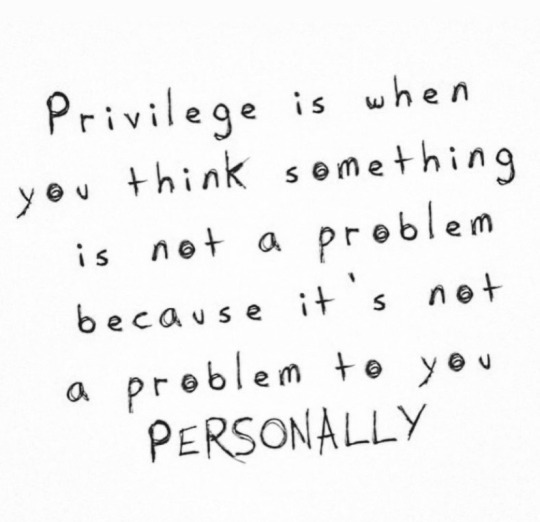
For almost their entire lives, people of colour have had to defend, explain, hide or submit to acts of outright discrimination just because their skin is not white. As a Punjabi Sikh woman born and raised in Canada, I remember being bullied and beaten up, chased on my way home by white boys shouting “paki” and worrying about the teachers judging my parents’ accent as we went to parent-teacher meetings. I learned to be careful, to try to fit in, hiding my Indian food at recess and not walking into a mall wearing a Punjabi suit. I witnessed complete strangers harassing my family with racial slurs and attempts to break our windows in the middle of the night. And I remember thinking “why are they doing this to us?” The fear and shock in my parent’s eyes traumatized me. As an adult, I discovered that my incredibly hard working father with a Masters degree from Punjab’s best University couldn’t get an entry level manual labour job when he first came to Canada because of his turban and it was only when he cut his hair that he was given employment. Now as a grown adult woman, I have felt the distress and micro aggressions that come with being “one of one” (the only person of colour) on a team and the unspoken pressure to work extra hard to prove my capability and worthiness. Why? Because the trauma of racism imprints a deeper scar of imposter syndrome on your mind where you have to work to undo the narrative that you are different and perhaps you’re not really that great, that perhaps you’re just the token brown person who was chosen to balance things out and that perhaps everyone here is questioning your worth and the value that you bring to the table. The residue of growing up and living within a racist system also makes you stronger. You get to a point where you must find your voice and use it to speak out against injustices. I learned this as a child in elementary where my parents didn’t know what to do with me coming home with good grades but also school suspensions because I chose to fight back. The fight against racism gets draining. Perhaps most draining is having to prove, justify or validate your lived experience to white people who are so blissfully ignorant to their privilege. People of colour need not endure further trauma to prove their trauma. It crushes the soul.
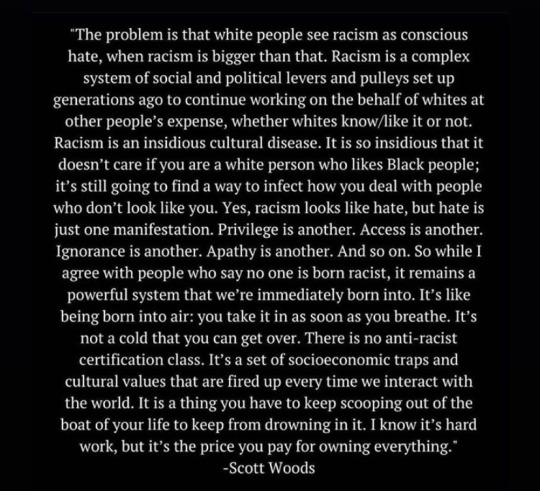
I love my skin. I am proud to be brown. I’m incredibly proud of my Sikh Punjabi roots and now I thank my parents everyday for ensuring that I fluently spoke my Mother tongue before I spoke a word of English (at the age of 6). I also realize that mostly every successful person of colour that I have ever known who immigrated to Canada made it by being an entrepreneur because the racist system would never let them rise. Even the best place to work in Canada has yet to see more people of colour and especially those with “accents” rise to the top. I don’t want it to be but racism is something I and almost every other person of colour has learned to live with - and we must continue to fight it. To my non-white friends, keep fighting the good fight. It’s on us to change the world for the next generation. We cannot normalize injustice as culture and pass it onto our children. And to my white friends, lean in. Start reading books from anti-racist people of colour, park your resistance/ego about white privilege, let yourself feel uncomfortable - listen, learn, seek out the truth and use your privilege to drive systemic change. It’s great that you may not “see colour” or think of the world in racialized ways but saying that is a cop-out. It only further undermines the experiences of racialized people who have been subjugated to a world that is racist and a world where systemically and unfortunately, colour does matter. To those who much is given (in this case privilege), much is expected. Unhinge from your privileged opinion. Listen, learn and be an ally to those who have been dealt the harsh blows of racism.The fringe needs the core to drive change from the inside out. Together, we can restore humanity to a state of oneness - the ultimate law of the Universe.
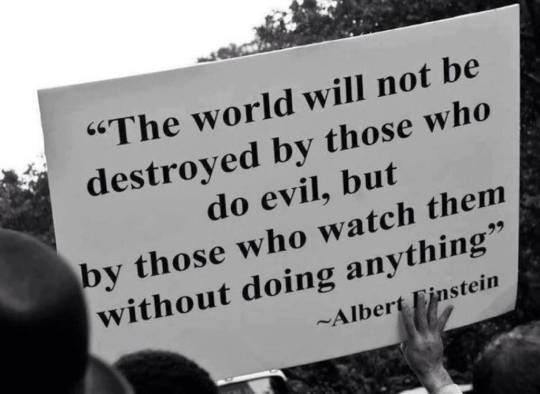

2 notes
·
View notes
Text
One of the things that’s so irritating to me about G. Willow Wilson’s run is that she’s actually taking the story in directions I really want it to go, picking up on plot threads ignored since the end of Rucka’s run, bringing back the mythology and resolving (finally!) Diana’s inability to return home with a development that enables the Amazons and Themyscira to be a recurring part of Wondy’s ongoing story again… and yet somehow she’s doing it in the blandest, most uninteresting way imaginable.
A lot of it isn’t technically bad. She’s not pulling any James Robinsons here. But there’s no emotional punch, no surprise, no heart to it. At the end of the day, she’s just moving pieces around a board.
As an example of this, let’s talk about her writing of Veronica Cale.
Veronica sees love as a weakness. When you open your heart to others, you give them power over you, hanging only to trust and blind hope that they won’t use that power to hurt you, to betray you, to destroy you. When you allow yourself to love, you make yourself vulnerable. You cultivate avenues by which your enemies can attack and manipulate you.
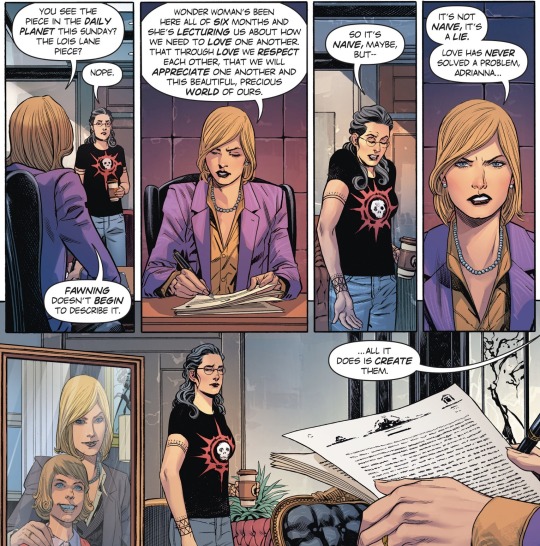
Veronica: Wonder Woman’s been here all of six months and she’s lecturing us about how we need to love one another. That through love we respect each other. That we will appreciate one another and this beautiful, precious world of ours.
Adrianna: So it’s naive, maybe, but--
Veronica: It’s not naive, it’s a lie. Love has never solved a problem, Adrianna... all it does is create them.
And this was her mindset before the only two people in the world she’d let into her heart were stolen from her by a pair of sadistic gods seeking to use her to get to Wonder Woman.
Years of tucking an empty-faced, inanimate child into bed each night while her daughter’s soul screamed from the prison of the fear-gods’ gemstone. Years of being forced to scurry at Phobos and Deimos’ bidding as they held Izzy’s life in their hands. It sends her down a very dark road, one that leads ultimately to her ruin and that of everyone around her.
Veronica will not be controlled again, and so she works systematically to control everyone and everything around her. Every person and every resource is a potential tool in her cause, and she’s willing to hurt, kill, torture, manipulate, exploit, curse or destroy anybody if it gets her a single step closer to rescuing her daughter.
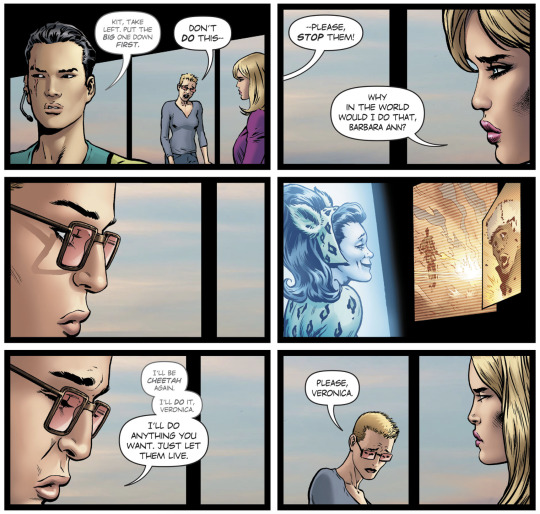
All of this comes to a head at the end of Rucka’s run. Due in part to Veronica’s own actions, her daughter is lost to her forever. Safe but unable to leave Themyscira, Izzy must remain with the Amazons -- to be raised by the people of the woman Veronica loathes most in the world.
Sick with grief and self-loathing, she lashes out at the only other person who cares - Adrianna, the AI patterned after her lost friend. She rejects that friendship, denies Adrianna’s personhood and dismisses her as a tool, seeding the beginnings of a rift.
She’s attacked by a murderous Cheetah, symbolic in that moment of everything she’s burned and broken and corrupted in her fruitless quest, only to be rescued at the last by none other than Diana.
Which leads to this heartbreaking exchange:
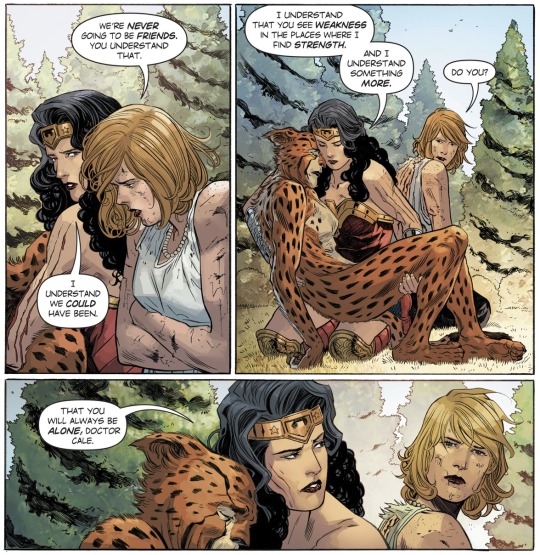
Veronica: We’re never going to be friends. You understand that.
Diana: I understand we could have been. I understand that you see weakness in the places where I find strength. And I understand something more.
Veronica: Do you?
Diana: That you will always be alone, Doctor Cale.
And that’s where we leave her, alone amid the rubble of her life.
As significant as she is to Diana’s Rebirth story, it’s no surprise that the writers who followed Rucka (James Robinson, G. Willow Wilson) wanted to return to her. Unfortunately, neither of them seem to have known quite what to do with her beyond ‘Veronica is rich and powerful and hates Wondy’.
To be fair to them, this would be a challenge for any writer. Rucka created this version of Veronica with a very defined character arc, from the kidnapping of her daughter that begins her descent into villainy, to her tragic ruin which sees her daughter put forever beyond her reach. For ten years her sole motivation has been saving Izzy no matter what the cost, and now that’s gone. What is there left for her? Where does she go from here?
And the easiest answer is, well, she still hates Wonder Woman and blames her for what was done to Izzy, so I guess she’ll just make it her new mission to fuck with Diana by creating new metahuman villains to run rampant or launching a campaign to destroy Wondy’s reputation.
Robinson goes the former route, in the process reducing Veronica to a sadistic mad scientist, throwing monsters at Diana and conducting experiments on her foes simply because she likes hurting them.
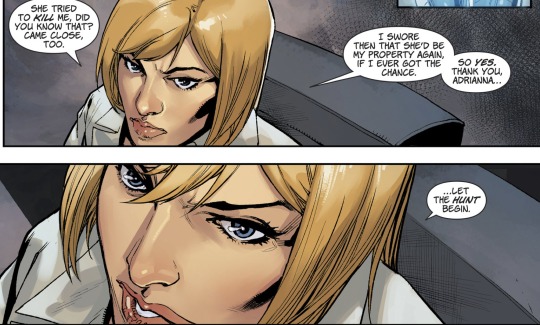
“She tried to kill me, did you know that? Came close, too. I swore then that she’d be my property again, if I ever got the chance. So yes. Thank you, Adrianna... let the hunt begin.”
Wilson opts for the latter, and on its face this route has more promise. The celebratory news coverage of Wonder Woman and her (infantile, lecturing, false) mission rankled Veronica even before she became ensnared in Diana’s orbit. Being surrounded by it now, all this fawning over the woman Veronica believes ruined her life? That must burn her. It’s not hard to imagine her launching a covert campaign to show the public the ‘true’ face of Wonder Woman.
The problem here is that such a story has been done, and done very effectively, in Rucka’s first run on Wonder Woman, where he first introduced Veronica Cale. If you want to avoid simply retreading old ground, you’re going to need something more, a new angle.
Wilson has one, but it’s not good.
For context, Wilson’s run begins in Ares’ Themysciran prison, now also home to Grail. In amongst the other weapons littering their cell, Grail idly picks out a sword named Godkiller. Ares (who, apropos of nothing, has decided to stage prison break so that he can live a reformed life as a Noble and Just god of mass slaughter, wtf Willow) demands that Grail use it to kill him.
For reasons that, nearly twenty issues later, still have yet to be satisfactorily explained, Ares dies and is immediately resurrected, resulting in a “cosmic paradox” (?!) that tears Themyscira, Olympus and all their connected realms asunder (?!?!), spitting confused divinities and mythical beings out into the mundane world.
Veronica, observing the appearance of these gods, immediately begins investigating and comes to the bewildering conclusion that Themyscira is gone and therefore Izzy is dead.

This immediately makes no sense. Veronica spent ten years doing everything she could to get Izzy back, in the face of impossible odds. The scientific analysis may be pointing to Themyscira’s collapse, but that’s purely theoretical — and all around her, as gods and monsters materialise from nowhere, Veronica is being presented with evidence that she’s closer to Izzy than ever before. You can’t tell me that this woman, with her single-minded purpose, would give her daughter up for dead before she’d seen a body.
But okay. She thinks Izzy is dead. She’s hurting and she wants Diana to hurt, too. So she decides she’s going to tear apart Diana’s reputation.
By sending the goddess Nemesis to blow up a city street, waiting for Diana to show up and fight her, then storm in with cameras declaring loudly that “Wonder Woman attacked my employee in the course of her job protecting Cale Enterprises from superhuman threats” and then proceeding to file a massive lawsuit against her.
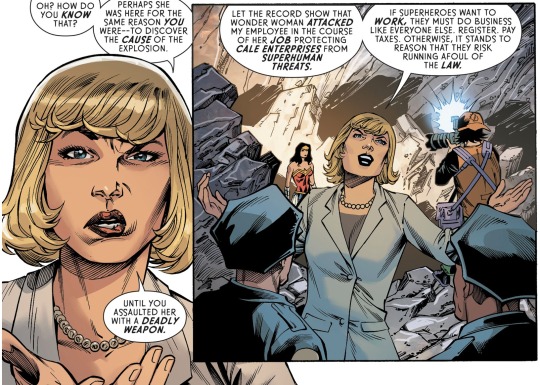
“Let the record show that Wonder Woman attacked my employee in the course of her job protecting Cale Enterprises from superhuman threats. If superheroes want to work, they must do business like everyone else. Register. Pay taxes. Otherwise, it stands to reason that they risk running afoul of the law.”
This is… so far from Veronica’s MO it’s not funny. She’s a meticulous planner, operating from the shadows, never showing her hand before she’s well and ready. Diana was clashing with Veronica’s people for years before she had the slightest idea who they were working for or what they were trying to get from her. She wouldn’t needlessly expose herself to media scrutiny with a stunt like this — not when she could far more effectively demolish Diana’s reputation from a distance with a team of PR operatives, some high-level media and political connections, and an AI ally capable of getting in almost anywhere.
But it turns out Veronica is kind of being controlled by Nemesis, who’s stoking her grudge against Diana (because, in an outrageous bit of mythology fail we don’t even have time to get into, Wilson thinks Nemesis is the goddess of… nemeses), so maybe we can explain away her brash incompetence as her not being in her right mind.
That doesn’t explain why, upon Diana’s breaking the spell, Veronica immediately bursts into tears and starts babbling, “I just want her to be safe— I can’t stop thinking about it— about her being alone and scared and not understanding what was happening—” And sobbing into Diana’s shoulder, she agrees to drop the lawsuit if Diana will search for Izzy.
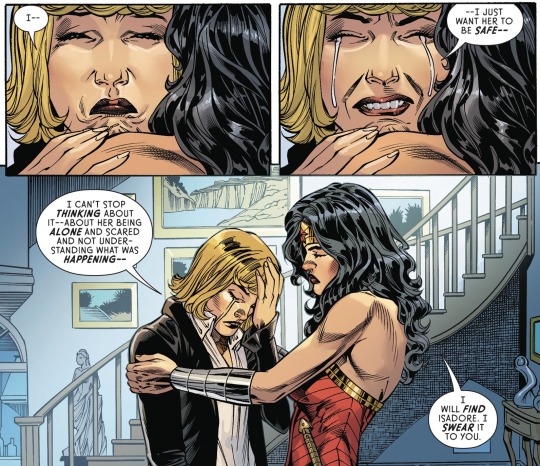
“I--” [sobbing] “--I just want her to be safe-- I can’t stop thinking about it-- about her being alone and scared and not understanding what was happening--”
Remember, two of the very first things we learned about Veronica: she believes love is a weakness that her enemies will exploit, and she does not fucking trust Wonder Woman. She’s spent a long time cultivating a stony facade to hide her vulnerabilities. She’s not going to let that drop for Diana, not easily. She’s certainly not going to trust to Wonder Woman, the person she blames for Izzy’s loss, the task of recovering her daughter.
But that’s exactly what she does.
So then we get to WW #76. Diana has found Themyscira again, but before she can get caught up with her family, Diana wants to get Izzy back to her own family.
So naturally she LEAVES IZZY ON THE ISLAND and flies off on her own to pick up Veronica and bring her back.

“A reunion that is within my power to grant… yet it means bringing my enemy to the shores of my homeland.”
NO IT DOESN’T YOU ARE MAKING THIS NEEDLESSLY COMPLICATED FOR THE SAKE OF MELODRAMA
So Diana drops into Veronica’s house all, ‘hey, I found your daughter, she’s in the place you hate most in the world, so I thought I’d bring you to her rather than make this easy on you’.
And Veronica, rather than saying, ‘if you found her, why didn’t you bring her with you?’ or ‘why should I trust you?’ or ‘what’s the catch?’… drops her gun and dissolves into a weepy emotional puddle. VERONICA.
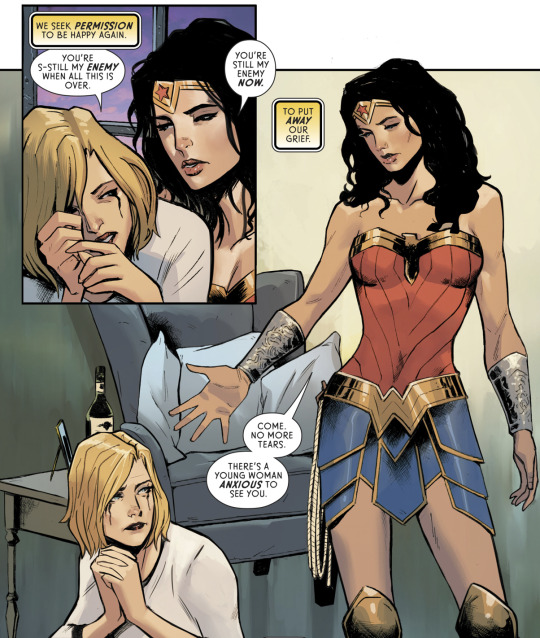
Veronica: [wiping away tears] You’re s-still my enemy when all this is over.
Diana: You’re still my enemy now. Come. No more tears. There’s a young woman anxious to see you.
Where Robinson erased Veronica’s love and desperation to rescue her daughter in favour of a simplistic villainous portrayal, we see Wilson doing the exact reverse -- erasing Veronica’s viciousness in favour of a simplistic portrayal of a forlorn mother who thinks only of her baby.
And again, NONE OF THIS IS NECESSARY, YOU COULD HAVE JUST BROUGHT IZZY HERE.
Bad characterisation and hacky dramatic devices aside, what makes this story thread particularly bad is that it effects a significant change both in Veronica’s individual arc and in Diana’s relationship with Veronica without actually adding anything to either. There’s no conflict, no complication, no trade-off, no character growth. It’s a half-arsed quick fix, removing an obstacle without any effort or repercussions, which is flat-out bad writing.
And what sucks is it didn’t have to be this way.
Consider this: What if, instead of instantly giving up her daughter for dead, Veronica immediately gets to work hunting for a stable path through the cracks in the worlds? And what if this time, rather than her efforts being a threat to Themyscira and the mortal world, they’re the key to Diana finding her way home and saving Themyscira?
In this scenario, Themyscira is not under attack from within (i.e. the civil war resulting from Grail’s overthrow of Hippolyta), but from without. Evil spirits and mythical monsters have been spilling out of the Underworld through the cracks in reality and the Amazons are engaged in a desperate fight to subdue them and stabilise their world before it becomes subsumed into Hades’ realm. (You could do some cool stuff with the topography of the Underworld beginning to bleed into Themyscira - the flaming river Phlegethon slicing through the landscape, the city strangled by poppies and asphodel.)
The path that Veronica locates leads through the Underworld, so instead of a wacky journey through the ~wild world of Hippolyta’s imagination~ we get an awesome katabasis story! One way or another, Diana and Veronica’s paths converge in the Underworld and they end up unwilling allies, relying on one another to fight their way through.
This unlikely team-up also gives us the opportunity to examine the characters’ conflicting worldviews and unresolved issues with each other. Greek mythology is full of daimones, personified concepts (e.g. grief, rage, nightmares), which provides some great opportunities to bring personal insecurities to the surface and make literal characters’ battles with their fears.
So they make it out of the Underworld and into Themyscira. They find their way to the Amazons’ stronghold, where Veronica is finally able to embrace Izzy. It’s an emotional reunion, but one fraught with uncomfortable edges. Veronica’s spent ten years on a very dark road. She’s committed monstrous acts, ruined lives, doomed souls in her quest to get her daughter back. If Izzy knew the woman her mother had become, it would terrify her.
And as the Underworld encroaches, threatening to swallow whole these women who welcomed Izzy in as family, Veronica’s faced with a choice: save herself and her daughter, while breaking Izzy’s heart — or be the hero Izzy still believes her to be and stand with her enemies to save Themyscira.
With Veronica’s help, they triumph. But the new status quo brings new challenges - maybe Themyscira is pulled into the earthly realm. Maybe the walls between dimensions, while stabilised, remain porous, riddled with cracks through which gods and monsters can escape and wreak havoc. And of course, Ares is now loose in the world, unchained, along with Phobos and Deimos, whose actions brought so much misery on Veronica and her loved ones — and who, now that they’re free, have some scores to settle.
And so, while Veronica is able to bring closure to one awful chapter, returning home with her daughter, she emerges with a new resolve: to monitor, control and — if need be — destroy these gods that now lurk in the world. Because she’ll let the worlds burn before she lets them touch a single hair on Izzy’s head ever again.
Godwatch is back online.
But nah, what we get instead is a trite little reunion that ties everything up in a neat bow for Veronica, with no sacrifices required on her part and no consequences for her terrible actions, because it’s easier to portray her simplistically as a bereft mother than to remember that, HEY SHE’S ALSO MURDERED A LOT OF PEOPLE HERE.
29 notes
·
View notes
Text
You are Wrong about Lotor
The advertisements for this season promised to blur the lines between good and evil and delivered exactly that. By the conclusion of Voltron Legendary Defender season Six our paladins have apparently killed the only true hero in this show, destroyed their only access point to unlimited clean energy, and kickstarted a civil war in the Galra Empire. Team Voltron, has become the villains.
What’s that?
Doesn’t sound like we watched the same show?
Let me explain.
The writing and framing this season were truly incredible. Meticulously calculated to provide just the right information at just the right time to draw the exact wrong conclusions. It aims to provoke a violent emotional reaction in the viewer and discourage them from thinking critically about what they’re seeing. Even better, it’s a double trick, as additionally, our protagonists in the show fall into the same trap. It’s so incredibly meta, to have your audience make the same, independent conclusion as your characters.
It’s emotional manipulation at it’s cruelest, and this is only the first of the one-two punch that’s due to land it’s second hit next season.
Because team Voltron is wrong about Lotor, and so are you.
To cut to the chase, the story the narrative wants you to conclude, is that Lotor is keeping a group of Alteans hostage to systematically drain them of quintessence for use in his experiments.
I’m going to tell you right now, that’s not what’s happening.
Romelle is either hopelessly naive or malicious: she straight up admits to only knowing parts of the truth. Suspiciously, she is the first and only person Keith and Krolia encounter, but just so happens to be the only person privy to the ‘dark secrets’ of the colony. What luck! Of course, they must avoid interacting with the other Alteans who reside in the colony, as nobody else would believe Romelle if she told them. Convenient. As far as I am concerned, everything she tells them that was not also directly witnessed by Krolia and Keith is suspect.
Speaking of, how is it, exactly, that we know Lotor is extracting quintessence from these people? Hmm? Do we have any concrete proof? No. Keith jumps to conclusions. Keith shoots first and asks questions later.
Upon discovering the emaciated Alteans in the pods Keith immediately declares that Lotor must be harvesting their quintessence. We see no actual quintessence in the lab, and by the accumulation of dust it appears that the facility has been unused for quite some time. Logically, the quintessence that the blade intercepted, and that Keith and Krolia have been seeking the source of, had to have come from somewhere, but that place isn’t this lab. But, this is no time for logic; Keith, Krolia and Romelle race off to the Castle of Lions to confront Lotor.
Sendak was absolutely correct when he said that the paladin’s greatest weakness was that they value the lives of others. Because just the suggestion that some innocent people may have lost their lives is enough to prompt the paladins to ambush someone, guns drawn, who has thus far proved himself a powerful and valuable ally. They ask Lotor exactly zero questions and don’t allow him the time to explain themselves. And it was the idea alone that caused them to act, because at no point did they seek out any proof whatsoever!
Allura alone I will grant some leeway in her reaction.
I 100% understand why Allura reacted the way she did, after all the shit she’s been through. She’s only just managed to feel that not all Galra are as monstrous as Zarkon. She’s fallen in love with his own son, and she’s hoping with everything she has that he’s really a good person. I’m sure there was still some residual fear there, it can’t have been more than two years from her perspective since everything she’s known and loved was taken from her. It takes so long to shake a trauma like she’s been through, and many people never fully do. And when she discovers that Lotor has been hiding the existence of other Alteans from her? That he admits to having to sacrifice a few? That fear and anger flared up.
It’s conspicuous, that circumstances conspire to both render Lotor unconscious and to remove him from the castle before he can explain himself. He doesn’t even hear half of the things that he’s been accused of doing and so wouldn’t know to deny them. No one ever, at any point, asks Lotor if he’s been harvesting quintessence from living Alteans. We’re left waiting to hear his side of things, and then, the next thing he says referencing Team Voltron is this:
“Zethrid, Ezor, my deepest apologies for lying to you both. But in order to gain the princess’s trust, and make the paladins of Voltron believe we were truly at odds, it had to be done.”
This comes at an interesting place in the narrative. Seemingly confirming that Lotor has been manipulating Team Voltron the whole time, and thus invalidating the sincerity of any of his prior actions since splitting from his generals. Because it follows immediately upon the horrific accusations he was denied the chance to refute it also tricks us into thinking he’s admitting to them. After all, if he’s been faking this entire time, what couldn’t he be capable of?
Except.
This apology is itself a lie.
In fact, regardless of whatever understanding Lotor and Axca have between them, it is impossible for them to have been working together at any point between Axca’s betrayal at Daibazaal and The Generals allying themselves with Haggar; after the point in which Allura and Team Voltron began extending some trust to Lotor. While it’s possible - even probable - that Lotor and Axca may have had contingency plans for faking a split between the generals and Lotor, and some of those plans may have included attempting an alliance with Voltron, there are far too many moving pieces for all that transpired between them to have been planned ahead of time. Far too many opportunities for one or all of them to have died. And, consistently, Lotor puts his own survival and that of his loyal allies above all other priorities.
Simply put, if the generals hadn’t been recruited by Haggar they would have been executed. If Axca was loyal to Lotor at this point she would have had no good reason to risk her life by returning to the empire, especially when Lotor had just killed Zarkon.
He says this when he does because he needs Ezor and Zethrid to not fight him over returning to the Castle of Lions. His words towards his generals, notably using ‘power’ instead of ‘peace’, are chosen to convince them to work with him again and to give the impression that he has control of the situation and a plan - which he absolutely does not.
We know this is a facade, because the moment Lotor comes face to face - or ship to lion - with Allura again he drops it and reverts to language and mannerisms he’s been using before with her. But he’s doing this openly in front of his generals and they’re visibly perplexed.
Lotor rushes back to the Castle of Lions to attempt to reason with Allura. He loves her, and he's willing to put aside his pride and plead with her in front of both of their teams. You can hear the panic in his voice as he tries to hold it together.
And then Allura accuses Lotor of being worse than Zarkon. Everything after that, isn't really him. He has a mental breakdown. He’s had every support ripped away, and 10,000 years worth of repressed pain and anguish come crashing down on him. He's lost everything that matters to him, had the one person he though he could trust, the woman he loves, accuse him of his own greatest fear, and he's hurting.
In meta about prior seasons I’ve seen it expressed that it’s a miracle that Lotor escaped his upbringing as apparently put together as he did. He’s paranoid, and occasionally willing to go against his own moral code if it means surviving another day, but surprisingly stable.
Well, it turns out he isn’t. Lotor fairly obviously has some degree of mental illness, and it unfortunately contributes to his decline in the season finale. At the risk of getting too personal in a fandom meta post, Lotor’s breakdown is eerily familiar to me - and I would expect many other fans with experience with mental health issues as well. I too have had crisis like that, complete with screaming, ranting and threatening to kill everyone who’s ever even so much as looked at you funny.
This whole situation went to hell because team Voltron has a history of making decisions based on emotions rather than logic. So far, it’s worked out pretty alright for them, but that’s about to change. They’ve lost their home, their best chance for stability and avoiding a civil war in the Galra Empire, and a loyal friend. Because they let their emotions get the best of them and couldn’t take fifteen minutes to sort out their facts from their fears.
The only negative thing. The only negative thing Lotor admits to, is that ‘many Alteans perished in [his] quest to unlock the mysteries of quintessence.’ He does not say how they died, he does not say he killed them, he doesn’t even say that their deaths were intentional. For all we know, they died in a lab accident. Those Alteans in pods? Among the many functions pods like those are established to have in VLD are healing and cryopreservation. We don’t even know that those people are the deceased Alteans in question. We don’t even know if they’re dead!
The one and only time we see the blue quintessence used as intended in show is when Lotor uses the last of his supply of it to energize his Sincline ship and attempts to pass through the gate for the first time. In response to Zethrid’s concern that this is the last of their concentrated quintessence Lotor states that once they get into the rift they will have access to an unlimited amount of it. Therefore, it stands to reason that the white quintessence found in the rift contains the same properties as the blue of unknown origin. But that the yellow and purple the Empire uses apparently does not. Lotor doesn't need the quintessence in the rift for the empire: he needs it for the Alteans. He's not manipulating anyone, his goals are the same as theirs: peace and free energy for the universe. While it’s likely the blue quintessence does have some relation to the colony, whatever that is, there is currenly no evidence whatsoever that it’s being extracted from sentient beings. He’s clearly looking for a replacement source as it is. He likely wanted to tell Allura about the Altean colony, but felt he needed to secure reliable access to the quintessence field before he could do so.
So what’s this second punch that’s going to land next season?
If you haven’t guessed already, think how this is actually going to turn out. Because we know Romelle is wrong, whether on purpose or by accident. She basically conspired to kill the man who did everything in his power to save her people and her culture. And she did so by turning his friends against him.
How are the paladins going to feel when they realize this? How is Allura going to feel? She left Lotor to die in the rift. After he begged her to see reason. After he confessed his feelings for her. After she fell in love with him.
Ultimately, despite what many people expected, and indeed what many people are saying, Lotor has never intentionally manipulated the paladins and he didn’t betray Team Voltron.
Allow me to repeat myself:
Lotor didn’t betray Team Voltron
They betrayed him.
Sincere thanks to all my fandom family in the Lotura 18+ discord. Nearly all of the conclusions reached in this meta were origionally hashed out during chat sessions. Love you all, and I hope for anyone disheartened by s6 this meta can give you a bit of hope for the future.
I sincerely believe, that when all things are said and done, Voltron: Legendary Defender is going to go down as one of the best shows ever created.
#Lotor#JusticeForLotor#voltron s6 spoilers#vld s6 spoilers#meta#long post#Allura#Keith#Romelle#Hate tries to Meta#Voltron Legendary Defender
2K notes
·
View notes
Text
Most Sensible Voltron End Game Ships:
Note: this doesn't mean I don't LIKE other ships, but logically, given that Voltron is a CHILDREN'S CARTOON, these ones make the most sense story-telling wise. Here's why.
Hunk/Romelle:
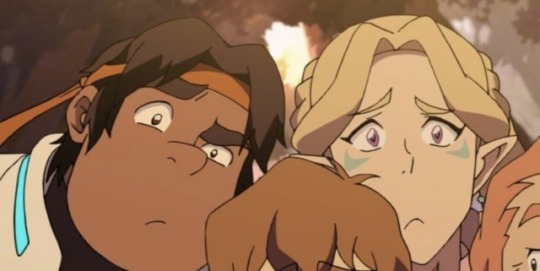
I start here because I think this will likely be the least controversial. They set up in the first ep of S7 that Romelle and Hunk clearly think alike. They also set up that even though Lance is attracted to Romelle initially, she soon actually annoys him. On the other hand Hunk finds Romelle's thought processes to be so like his own that he acts she's like his own personal God-send ("It's like, I think it, you say it!") Likewise, Romelle seems to rather enjoy her interactions with Hunk, and the way he supports her curiousity. For once Hunk gets to be the one "in the know", and Romelle likes and appreciates the way that he interacts with her.
I know there's a lot of talk about doing right by an LGBTQ+ rep character, but I think the "Nice guy who's really smart and awesome but happens to not be conventionally attractive" rep deserves to get an attractive girl who he really does genuinely like and connect with and who genuinely likes, connects with, and respects him.
Lance/Pidge:
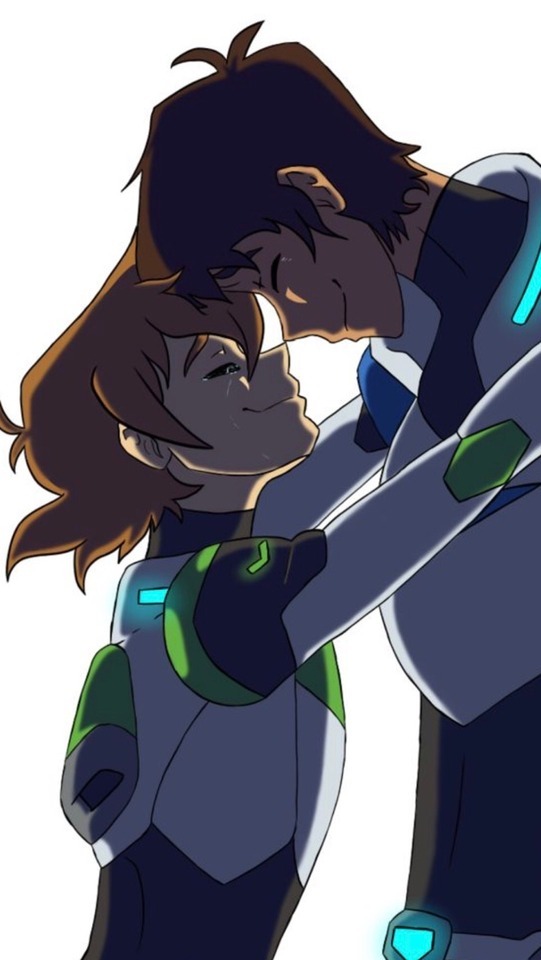
Although we are all understandably wary of trusting anything the writers say at this point, they have pretty much said that they do have an end game for Lance and it's not Allura. While I'd personally love to see a Klance ending, it seems pretty clear that Lance and Keith are both being set up to be straight--Lance shows attraction to basically every conventionally attractive female, and Keith/Acxa is a thing (and a reasonable thing, which I will get to next). So..
Lance and Pidge: first off, Pidge constantly points out and makes fun of Lance's crush on Allura, and at times even seems annoyed by it. She definitely doesn't show any sign of caring about the romantic interests of any of the other characters. Although it's been subtle, as Pidge's priorities have clearly, and rightly, been elsewhere, there's been some hints from the beginning that she's certainly paying attention to Lance's love interests, and is maybe jealous and just covering it up by making fun of him--which is pretty age appropriate, and typical of girls with older brothers: She's more comfortable approaching him on guy level and expressing her annoyances (unconscious jealously) through teasing him and, in the process, attempting to dissuade him from said romantic pursuits.
The writer's stated that Lance would get what he NEEDS in a relationship, not what he WANTS. Pidge is not girly/feminine in an aesthetic sense (what Lance thinks he WANTS), but she's perfectly pretty--it's not like Lance wouldn't be attracted to her once he gets passed his old-school markers of attraction based purely on conventional outer symbols of femininity (I.e. If he saw Pidge a few years older and in a dress, he'd almost certainly have a different reaction to her). Pidge does have an abundance of qualities that Lance NEEDS in a partner.
Pidge and Lance balance and trust each other. They have from the very first episode of Voltron. If you think of the first episode as establishing our main and most relatable characters, we really enter the story through the trio of Lance, Pidge and Hunk. Keith and Shiro--who they are and how they're involved in what's happening--are mostly mysteries to us in the first ep. In the typical trio story set up you have the main male character, who represents ego, in story structure, and you have his two best friends, who represent his ID and Super-ego. Often the Super-Ego character is female, and the ID male. The function of the super-ego is to check, regulate and correct the impulses of the ego, which the ID often supports/supplies. The super-ego, basically, is the one who thinks things through, when the ego doesn't want to, and the ID can't. Pidge is the super-ego.
What Lance NEEDS is someone who he both implicitly trusts and who can be the things he isn't in such a way that it helps him to grow, while still having his partner see him as an equal and having respect for the qualities and strengths he has as an individual and that he contributes to the balance of the relationship.
Allurance shippers will say "Allura can be those things too!" But she can't, because she is not and never will be his equal. She is a 10,000 year old Princess from a race of people that are vastly more evolved than humans. She was raised to rule a planet and take on the burden of the universe. No matter how much she might LIKE Lance and trusts him as an ally and a friend, that quality of equality and challenge that actually attracts confident and capable women to men does not exist between Allura and Lance--which is why she was attracted to Lotor.
The contrast between how Allura reacts to Lotor and how she reacts to Lance is a great representation of what creates actual romantic attraction vs. friendship compatibility: Lotor is her equal in his own right and can challenge her to see and grow beyond her pre-conceived notions, while having enough similarities that he understands and fits into the world she comes from and will return to (that of Galatic leadership and responsibility). Allura and Lance do not have that kind of shared reality and the ability to build together as equals that comes with it.
Pidge and Lance, on the other hand, start from the same place--they're kids who were smart and capable and followed a dream, and who have taken on the unanticipated responsibilities and adventures that came as a consequence of following that dream. They constantly demonstrate that their gut instincts are aligned. They do not have fundemental differences in terms of values and unconscious life expectations, and those things matter when you're talking endgame, because endgame means when two people are grown ups and they have kids and grow old together--that real life stuff.
Allura and Lance might have a minor romantic arch, in fact I suspect they will, because they will need to in order for all both Allura and Lance to fully realize they're not compatible. This will also force Pidge to become conscious of her feelings for Lance. From there we can from there spring board into Pidge/Lance and back into...
Lotor/Allura:
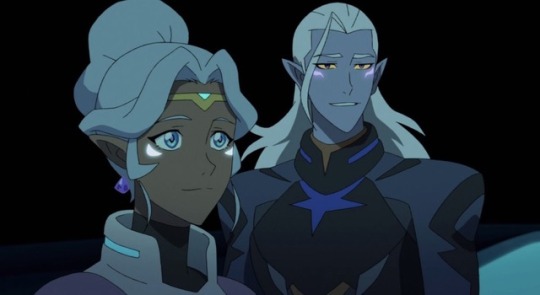
So, I'm not at all surprised we didn't see Lotor or Haggar in Season 7. It would have been too easy. We needed the stakes to be much higher, and the only way to do that was to bring the Galra threat to Earth, which couldn't have happened with Lotor as Emporer, or even with Haggar in charge--she's a much bigger schemer than just blindly chasing those lions across the galaxy like all those dumb male Galra meatheads want to do. Also, it gives her time to realisticly retrieve Lotor, fix him physically, and in the process develop some sort of relationship that would lead to them trusting each other enough to come back (allegedly) on the same side in S8.
I don't want to speculate on the plot of S8, and I won't. But I think that plot stuff aside, Lotor has to come back for the sake of Allura's character development.
ALLURA IS A RACIST. She is not malicious (just like most racists aren't malicious). But she seriously discriminates against the Galra just for them being Galra. She has a reason, no one can deny that--Just like someone who gets beat up by a gang of white guys has a reason to be wary of groups of white men, and they might take the trauma of the experience to the degree that they unconsciously start to demonize white men as a group... The trauma creates predudice because the brain is looking for a way to protect you from the trauma that just occurred. So it notes visual markers associated with the trauma, and when it later sees those markers it gets triggered into a state of flight/fight in order to (ideally) prevent you from reexperiencing the trauma associated with those physical markers. It's an evolutionary imperative--it's why we all jump across the room when we see a spider. But this primal imperative does lead to discrimination against groups of people. In my example, being fearful of groups of white men after being the victim of a gang beating is understandable, but is still a PREJUDICE based on their physical likeness to individuals who committed terrible acts, when in reality those physical traits have nothing to do with the terrible act.
It seemed like Allura was making progress with her predudices because of her relationship with Lotor, but Lotor is half Altean. He had to prove to her several times that he was "civilized" and even more knowledgeable about aspects of Altea than her. She fell in love with the Altean part of him. The literal second that she was given reason (by an ALTEAN stranger) to believe that he'd done something terrible and “GALRAN”, she instantly jumped to betraying him without even listening to his side of the story. This act proves that she didn't ever actually consciously see and acknowledge her predjudice and the irrational assumptions it causes her to make, she just was able to temporarily over look the Galran in Lotor for the Altean. So, Allura still has some major self realization to do in this department.
Next, the rash actions of the Paladins destroyed what could have been peace in the universe. Lotor gave them the option pretty much up until the end to stop and think things through even after they betrayed and attacked him. But at the end of S6 it's pretty clear it's Allura calling the shots on whether or not the team listens to Lotor or fights him. And we all know what happens:
She lets her emotions win. She prioritizes her anger--at herself for trusting a Galra--and she completely fails to care about (and likely think through) the bigger picture. Rather than realizing that the new emperor of a civilization that has been systematically enslaving the Galaxy for 10,000 years is trying to give agency back to planets, to create peace, harmony and a universe that works together to fulfill the needs of the whole, she doesn't even listen to him, she just attacks. With Lotor gone, of course the empire will fall and divide to the various generals of power. If Team Voltron had stopped and thought for 5 seconds about that they maybe would have realized that leaving Lotor in that rift was the most selfish and childish thing they ever could have done, humanitarian principles aside even. How many more worlds besides Earth suffered and will suffer for ALLURA'S emotional reactions that stem most deeply from PREJUDICE?
To be clear:
ALLURA believed the word of an ALTEAN she did not know, over the HALF-GALRAN she had fallen in love with, all because she FEARED she was wrong to trust someone with GALRAN blood: "You're more like Zarkon than I could ever have imagined," she tells Lotor. NOT "You're more like Honerva (AN ALTEAN) who began this whole mess by experimenting on quintessence and what happened when one combines it with their own life force and then became so addicted to it that she went crazy and enabled terrible things to happen to innocent peoples and planets." Nope. Even though in all honesty that comparison would have been more accurate, it didn't occur to Allura to accuse Lotor of being corrupt like his ALTEAN mother. What she says to him is essentially, "You're corrupt (and thus more) like your GALRAN father."
So, in order for Allura to grow into someone who is actually mature and responsible enough to lead the Voltron Colition and bring peace to the Galaxy, she's going to have to see the serious error in her actions, and the root prejudice that actually lead to them. And Lotor will be the one to make her see it.
From the moment the Paladins take Lotor prisoner he points out that Allura is discriminating against him based on species and parentage. It's pretty clear that this is set up to be their arch--Both of them are deeply flawed and magnificently gifted individuals who were born and raised to rule worlds, if not whole galaxies. They both have let their personal fears and flaws get in the way of what they could achieve together. In Allura's case the fatal flaw is predudice. In Lotor's it is lack of trust. He should have told her about the Altean colonies, but, rationally feared that he couldn't trust her to hear him out--irony being, if he'd brought it up privately and volunteered the info she probably would have reacted differently. However, Lotor has never had anyone he's trusted or who has trusted him, so he doesn't know that is how trust works. 😢
These two are designed to point out each other's flaws, and help them to correct them (not to make up for them, but to truly help each other change as people by, essentially, calling each other on their shit.) When they do that--Allura facing her racism; Lotor facing his lack of knowing how to actually trust someone fully--then the fatal flaws that lead to the ending of S6 (and the subsequent inter-galactic crisis that the simultaneous betrayal of these two baby-rulers, has caused) will be obliterated, the fatal flaws cured. Allura and Lotor will then be capable of resuming creating the new era of peace they were attempting before, but this time they will succeed because they will have learned to have real transparency/trust, rather than letting their unconscious fears be reasons to mistrust each other when they need to trust each other the most.
Lotura is a ship that is about real equality combined with real consciousness of self and other in relationships. Neither will be able to mature as characters until they see the flaws in Self that their initial (immature) love brought out in each other; the completion of the circle is then conscious change from seeing these flaws, and then forgiving themselves and each other for them. Only then can they can move into a mature love, which will allow them to bring out the best in each other without being blind to the flaws in each other and themselves.
Real love is seeing and dealing with both the good and bad, not ignoring one in favor of the other (this always backfires, as Lotura's first arch demonstrates). And that is a super valuable relationship lesson, that, in a show for kids, is profound and important. Love is seeing and accepting all of your partner and working together to change the things that need to be changed--not getting mad at each other, refusing to listen to what your partner has to say, deflecting with things like "your just like your dad," and subsequent retaliations that take the couple further away from the real issue, like Lotor does when Allura finally hits his weak spot and his basic response is "oh yeah, well your dad sucked too!" And from there it's all just them both being so hurt that reason is lost. That is the state of immature love.
Lotor and Allura are the only two characters who are each other's equals. They are the only two who can call each other on their shit effectively and who can help the other to change and grow. Their arch is about learning how to do that consciously and maturely. How to trust instead of doubt. How to see through the limitations of ego fears (Allura's prejudice, Lotor's not knowing how to trust) and to consciously choose loyalty to each other and to a fully shared vision. Without doing so, neither of these characters can transform from being in their immature Prince/Princess state to being ready for the mature King/Queen state.
Okay, Next...
Keith/Acxa:
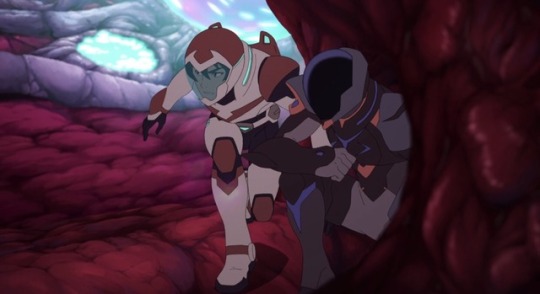
I keep seeing posts where people are saying that this came out of nowhere... frankly, you all need to go back and rewatch the series. Keith and Acxa first meet in season 2 inside the guts of a Weblum. Even though it's clear to them from the start that they're on opposite sides of a war (thank you space suits) they still work together to survive and don't abandon each other even when it might benefit them to do so--they demonstrate immediately that they have a similar honor code/value system.
Every time these two encounter each other, despite remaining on opposite sides, they always help each other in this way that shows they both are in wonder about it--they don't know why, but something, some sort of "I owe you" that can't ever seem to be repaid no matter how often they help each other, is just in affect between them. Obviously, this continues to mount in S7.
So, why can't they just be friends? Well maybe they can, but I don't think that's where this is going...
For one thing, Keith is clearly drawn to his Galran side. He wants to be with the Blades of Mamora more than Team Voltron for a long stretch of time. Then he meets his Galran mom. Keith never got along well with other humans, as is established all over S7. He does get along with all these Galrans.
Those of you who know psychology know, we pretty much always marry some variation of our parents. Keith has a Galran mom who he likes and loves a lot. Acxa fits his mommy archetype. And, she's a half-breed like him--she knows what it's like to not fully belong to any one people.
Plus, as stated and well established in canon, these two just can't help but constantly save each other. I think more than ANY ship possibility, this one is obvious, and would totally make end-game sense.
So...
Shiro/???:
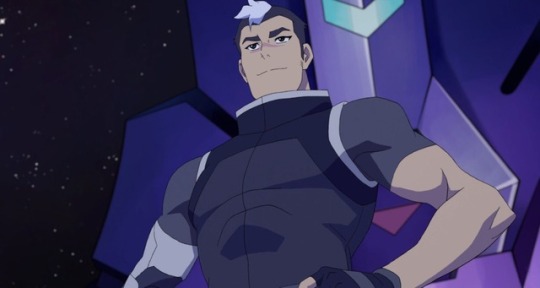
On the one hand, I'd love to see everyone all happy and paired up living happily ever after, but think it completely fits all of Shiro's character development to end up alone.
S7 firmly establishes that as a person, Shiro's ambitions/dreams matter more to him than the emotional needs of his partner, Adam. That's okay, there's nothing wrong with that, but, as a personality trait, it's not going to make for a happy long term relationship. In relationships you need to be willing to sacrifice things for your partner--not everything, not all the time--but you don't have the right to make serious decisions that affect you both without giving weight to the other person's needs. Shiro makes it clear that Adam's feelings don't matter to his decision to go on the Kerberos mission. That's not good partnering.
Adam, on the other hand, demonstrates a much more partner-oriented approach. He knows this is Shiro's dream, and because he loves him, he put his own wants/fears aside to support Shiro going on his first mission. He doesn't want to stop Shiro from being happy, but, when he tells Shiro that if Shiro goes AGAIN, Adam won't be here when he gets back, he's realizing that he's got to let Shiro understand that he can't be the only one in their relationship caring about the other's feelings. Adam needs a partner who will give the relationship serious weight in serious life decisions. Shiro demonstrates through his actions that he does not value the relationship more than his ambitions.
Shiro is a great team leader, but that doesn't necessarily make him a good life partner.
So, if Shiro ends up realizing this about himself and choosing to not have a romantic partnership, there is a really valuable lesson and story line there:
In American culture there is a lot of pressure to pair up. We are taught from childhood that real happiness hinges upon being partnered--at the end of every Disney movie the princess and prince finally get to be together forever and this is how we know they will "live happily every after". But not everyone is suited to relationships--and that has nothing to do with sexuality.
Shiro is gay, but that doesn't make him intrinsically more suited to long-term relationships than being straight makes anyone suited to long term relationships.
The LGBTQ+ community seems to be offended that Shiro isn't being represented in a relationship, but honestly I think they're being done a great service--Shiro is being understood as human rather than as his sexuality. His sexuality doesn't make him who he is. Being honest with himself about whether or not long-term relationships are actually something he is built for, is important for everyone to think about, and it's maybe especially important for LGBTQ+ kids to have a role model who does think about this.
One of the dangers of being LGBTQ+ is that people unconsciously reduce you to being a label--and you are so so much more than that label. Your sexuality is just one facet of Self, just like being straight is just one facet of Self for straight people. The pressure to be in a relationship as "proof" of your "identity" is very real for young LGBTQ+ kids, and the fear of leaving a relationship once you find one is far more intense because you fear your options are limited and you might not find someone else of your sexuality/who accepts your sexual-identity. So, LGBTQ+ kids are more vulnerable to staying in relationships that they've outgrown as a result of semi-conscious societal pressure to both pair up and to "prove" their "identity", and to fear that they might not ever find another relationship.
Shiro being the rep for the LBGTQ+ community teaches kids that you can be any sexuality/sexual-identity, and it doesn't change anything else about you--it doesn't change that you're smart and skilled and capable of being a space pilot, it doesn't change that it's perfectly possible and okay for a relationship (or even long term relationships in general) to not be right for you, it doesn't change your ability to be a good team leader... it doesn't change or mean anything else about you any more than a straight person being straight does. It's a facet of Self, to be weighed against many many other facets of Self.
...All that said, if they do somehow make it canon that Adam miraculously survived and he and Shiro are end game, that could be a great character development arch too, as long as it involves Shiro acknowledging that if he's going to resume being in a relationship with Adam he has to make decisions WITH Adam, and respect that Adam's emotions and needs matter equally to his own. If Shiro isn't willing to chose the truly rational emotional well-being of his partner (I mean Adam was reasonably scared that Shiro would die in space) over his own ambitions, he's not compatible with Adam. And that's okay too.
And, lastly:
Zethrid/Ezor:
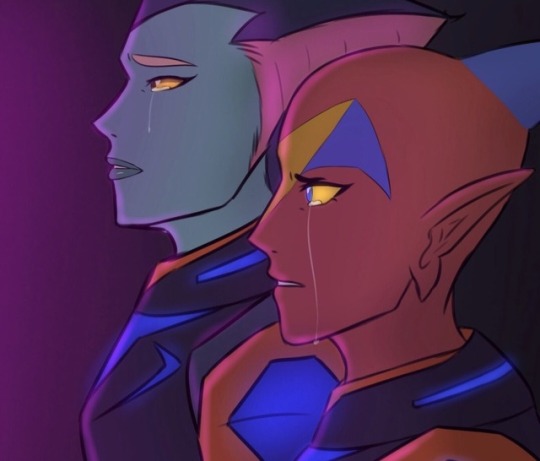
Here's another rep for the LGBTQ+ community. In contrast to Shiro's story line, which may end up with him consciously deciding that committed relationships aren't as important to him as other parts of life and is happy being alone, we are now being introduced to a relationship in which two women who have worked together for a long time are discovering happiness through exploring their romantic connection. From what we've seen in S7, it looks like Zethrid and Ezor are experiencing a deeper trust and intimacy as a result of their new relationship.
I think it's great for two characters who are largely portrayed as villains/secondary shades-of-gray characters to demonstrate to people how relationships can change your priorities. Zethrid and Ezor seem to have made each other the first priority, rather than the ever-convoluted mission. They're still in the middle of this war, but now they care most about looking out for each other, rather than prioritizing the Galra Empire or Lotor. They are finding meaning in what they've fought for through their love for each other. I think they will be taken on an arch that is the opposite of Shiro's, in which they increasingly discover that their relationship and love for each other matters more to them than the military ambitions that may have once fueled them as individuals. ❤️
In conclusion:
While I think this is clear, in case it isn't, I am not bashing on ANY ship in this post, I'm just explaining why I think these ships are the logical end game ships for good story telling.
If you are so inclined, I'd love to hear your thoughts presented in a respectful and legible manner. ❤️
Thanks for reading, I know it's a long one. 😅
#voltron ships#voltron legendary defender#vld#lotura#plance#kexa#hunk/romelle#vld shiro#vld s7#vld s6#voltron#shiro#takashi shirogane#keith/acxa#pidgance
611 notes
·
View notes
Text
Word and deed in the Unification Church – Rabbi A. James Rudin investigates
A VIEW OF THE UNIFICATION CHURCH
Presented by Rabbi A. James Rudin
Assistant National Director of Interreligious Affairs, The American Jewish Committee
at the American Academy of Religion Convention
San Francisco, California, December 29, 1977
Even as the Unification Church has every right in our pluralistic society to present its claims within the religious marketplace of ideas, so do we have every right to examine and analyze those claims in the light of our own studies, experiences, and faith commitments. I deeply believe that a religious movement must be judged not only by what it teaches but also by what it does; the deed is just as important as the creed. The Unification Church is no exception.
My paper will thus examine two aspects of the Unification Church:
1) Its specific teachings about Jews and Judaism and
2) the impact and results of the Unification Church’s teachings upon a significant number of its members. [revealing testimonies below]
In my study, (“Jews and Judaism in Reverend Moon’s Divine Principle,” The American Jewish Committee, December 1976) I assert that “my systematic analysis of this 536-page document (Divine Principle) reveals an orientation of almost unrelieved hostility toward, the Jewish people, exemplified in pejorative language, stereotyped imagery, and sweeping accusations of collective sin and guilt. Whether he is discussing the ‘Israelites’ of the Hebrew Bible or the ‘Jews’ as referred to in writings of the New Testament period, Reverend Moon portrays their behavior as reprobate, their intention evil (often diabolical), and their religious mission as eclipsed. There are over thirty-six specific references in Divine Principle to the Israelites of the Hebrew Bible—every one of them pejorative.” Three examples citing collective faithlessness make the point: “The Israelites all fell into faithlessness” (p. 315), “All the Israelites centering on Moses fell into faithlessness” (p. 319), and “The Israelites repeatedly fell into faithlessness” (p. 343). (Emphasis added)
Unification Church supporters claim that such references actually reflect the Hebrew Bible and present a fair description of early Israelite communal life. For me, it is a limp and highly defensive argument. In all cases of alleged Israelite errors and stubbornness, the hope of redemption and atonement was always present. The Hebrew Bible credits the people with the ability to repent. Divine Principle seeks to discredit the ancient Israelites in order to transfer God’s heritage to another people. Incidentally, the words “faithless” and “faithlessness” nowhere appear in the Hebrew Bible.
In similar fashion, Divine Principle records some sixty-five specific examples and references reflecting the attitudes and behavior of the Jewish people towards Jesus and its role in his crucifixion—again, every one of them is hostile and anti-Jewish. A few examples will suffice: “…due to the Jewish people’s disbelief in Jesus, all were destined to hell” (p. 146), …“we can see that Jesus’ crucifixion was the result of the ignorance and disbelief of the Jewish people…” (p. 145), “As a matter of fact, Satan confronted Jesus, working through the Jewish people, centering on the chief priests and scribes who had fallen faithless, and especially through Judas Iscariot, the disciple who had betrayed Jesus” (p. 357), “Nevertheless, due to the Jewish people’s rebellion against him, the physical body of Jesus was delivered into the hands of Satan as the condition of ransom for the restoration of the Jews and the whole of mankind back to God’s bosom; his body was invaded by Satan” (p. 510). The last two statements, linking the Jews to Satan, go beyond even the infamous deicide charge—“Christ killer”—that has been hurled for so long against the Jewish people.
Apologists for the Unification Church claim that the Divine Principle passages dealing with this controversial subject have only indicted the “Jewish priests and leaders,” not the people. Yet the record speaks otherwise: the “Jewish people” in their collectivity are implicated time and time again in Divine Principle. The four examples cited here are illustrative of many other selections.
The anti-Jewish thrust of this theological document carries forth into an interpretation of Jewish history and of the current status of Jews and Judaism. There are nearly thirty such references and all are hostile, generally reflecting the worst aspects of traditional Christian displacement theology, and viewing the persecution of the Jews across the ages as punishment for their sins. Thus “Due to the Israelites’ faithlessness, the Jewish nation was destroyed” (p. 431), “God’s heritage has been taken, away from the Jewish people” (p. 519), and the “chosen nation of Israel has been punished for the sin of rejecting Jesus and crucifying Him” (p. 226). Reverend Moon brings the readers up to modern times:
Jesus came as the Messiah; but due to the disbelief of, and persecution by the people he was crucified. Since then the Jews have lost their qualification as the chosen people and have been scattered, suffering persecution through the present day. (p. 147)
Indeed, Moon declared in 1971 [in Master Speaks on February 14, 1974], “By killing one man, Jesus, the Jewish people had to suffer for 2,000 years. Countless numbers of people have been slaughtered. During the second World War, six million people were slaughtered to cleanse all the sins of the Jewish people from the time of Jesus,” In Moon’s linkage of the Nazi holocaust to the Jewish rejection of Jesus we have the total obscenity, the wicked result of a system of indemnity gone wild. This statement is a murderous update of the ancient malevolent deicide charge.
But there is more. Last December, the New York Times carried a full page advertisement signed by Reverend Moon in which Moon notes that if only the Jews had been members of the Unification Church they would have been spared Hitler’s actions. So, even in their death, the 6,000,000 slaughtered Jews are treated as theological pawns to be moved about on a Unification Church chessboard.
Thus, in Divine Principle and in other Unification Church documents, we are confronted with over 130 examples of an unrelenting litany of anti-Jewish teachings. Nowhere in Divine Principle does Reverend Moon acknowledge the continuing validity and authenticity of Jews and Judaism. From Abraham until the present day, Jews are seen as a people devoid of any genuine faith and spiritual qualities. “The inner contents are corrupt” (p. 532), Moon says of Judaism. He depicts the Jewish people as collectively responsible for the crucifixion of Jesus as allies of Satan. Jews have been replaced by a “second Israel” (who, interestingly enough, must soon be replaced by the “third Israel,” the followers of Reverend Moon). Furthermore, the Jews have lost God’s “heritage” and are still being “punished” for their many sins. The Unification Church’s basic teaching document is a feculent breeding ground for fostering and fomenting anti-Semitism.
The Unification Church’s response to my charges of anti-Semitism blandly noted that “Because there are almost no Jews in Korea, there was no danger of a careless phrase (sic!) abetting anti-Semitism as it might in other countries…” I believe I have shown that the anti-Semitism in Divine Principle is more than a “careless phrase,” and a total insensitivity to the Jewish people is patently clear in this tepid defense. Apparently it is all right to malign a group that does not dwell in one’s midst.
One must ask why the Unification Church has the need to transmit such hostility and anti-Semitism. In its announced attempt to build a new religious order, the Church states that “When a brighter light appears, the mission of the old one fades. Today’s religions have failed to lead the present generation out of the dark valley of death into the radiance of life, so there must now come a new truth that can shed a new light.” (p. 10). But as a student of religious history, and as a Jew, I must ask “What does the Unification Church intend to do, first, in a theological way and, then, in a political way with those religious communities who have seen, the “brighter light” but who have chosen to remain faithful to their “mission of the old”? Historically, Jews and Judaism have often stood alone against many of the world’s “brighter lights,” and many times the price for such action was death. That is why I, unlike some other observers of the Unification Church, am appalled and deeply concerned about the extant anti-Semitism in the Church’s teachings. Although it claims to wish to unite the human family in love and truth, the Unification Church continues to transmit in its sacred text and in other writings the same teachings about Jews and Judaism that have historically resulted in expulsions, pogroms, and murder.
Surely, we have the right to demand that the Unification Church, which professes a “New Adam,” a new life, not teach the same pathological untruths that earlier forms of Christianity did. If the Unification Church truly seeks to heal the human family, then its first obligation is to prevent the spread of anti-Semitism in all its forms. What is needed now is a complete revision of Divine Principle that eliminates every vestige of anti-Jewish teaching. No religion can bring harmony and peace to the world if its own soul is corrupted and filled with the poison of anti-Semitism.
And what about the non-Jewish world that does not accept the “new light” of the Unification Church mission? Does the Unification Church, which uses the principle of religious pluralism to justify its right to exist itself, allow for pluralism of belief? The statements of Reverend Moon are not encouraging. In an article in the New York Daily News of November 30, 1975, it is reported that Reverend Moon made the following statement at a private gathering:
So from this time [of peak] every people and organization that goes against the Unification Church will gradually come down or drastically come down and die. Many people will die—those who go against our movement. [Sun Myung Moon, Master Speaks February 14, 1974]
So much for the creed of the Unification Church; now let us look at the deed. What is the impact of the teachings of the Church on its members? How are the ideals of improving the world, of uniting mankind, carried out in the concrete actions of the Church and its followers?
I am convinced that the Unification Church uses dishonest recruiting techniques, hiding behind nearly seventy front groups, of which “Collegiate Association for the Research of Principle,” “Creative Community Project,” and “New Education Development Systems, Inc.” are three of the best known. Recruiters never identify themselves with Reverend Moon or the Unification Church until the potential member has already made a commitment. By the time the recruit realizes what he is really involved in, he is often so confused and disoriented from intensive weekend retreats, long seminars, sleeplessness, constant frenzied activity which is tightly supervised, non-nutritious food, and “love-bombing” that he may not have the will or strength to refute the demands of the group at that point. The skillful Unification Church members play on the recruit’s guilt, forcing him to renounce and remove himself from his past life, including job, school, and family. They weaken his identity, then, with strong guilt-oriented and approval-oriented sanctions, remake his identity according to Unification Church theology and role models.
After his initiation the new recruit is frequently put to work in what is called a “Mobile Fund-Raising Team [MFT].” He may work up to 18 hours a day, 7 days a week, collecting funds from the public, carrying out what is termed “heavenly deception” upon a generous and unsuspecting public. The new Unification Church member usually lies by stating that the collected funds are for various social welfare projects when, in fact, the large amounts of money go directly to Reverend Moon’s New York City bank to support the Church’s many real estate and media operations. Much of it goes also to support an increasingly luxurious life style for Reverend Moon and his chief aides, while the new Church members live in almost abject poverty, without privacy, often, without adequate medical or dental care, and without proper nourishment. Berkeley psychologist, Dr. Margaret Singer, has interviewed over 250 former Unification Church members. Her most shocking finding was the “psychological turning off of the hormonal process.” She has seen “repeated cases of menstruation ceasing in women and of men’s beards ceasing to grow.” Dr. Singer concludes: “These young adults have narrowed down their thought processes, constricted their vocabulary …and wouldn’t let their negative feelings show because of extreme pressure from those around them.”
The Unification Church’s theology and ideology has produced some disturbing actions among its members. Ellen Galligan remembers her MFT speeding across Michigan on a remote highway where one might pass another vehicle perhaps only once an hour. One early morning they passed an accident and they saw a “person flagging us down. Another man was standing there with blood all over his face. Our driver woke up our team leader, who said, ‘Don’t stop. Keep on going.’ You see we had to drive the whole night to get to the city the next morning for fund raising, and it was more important to keep going. There was never any concern about other people. I guess we just considered it was indemnity for salvation for them.”
In case after case, it is clear that the Unification Church’s zealous preoccupation with raising money transcends every other activity, even one of stopping on a lonely highway to assist an injured person.
Tony Gillard, a former Church member, “worked the ghettos. I would go in a migrant camp and take the last dollar from a poor family,” he says. “I did the same thing on Indian reservations.” Gillard, a black, was once brought before Rev. Moon for special praise because of his outstanding fund raising ability. “The Unification Church had its ‘house n*gger’”, Gillard notes, and he now considers the Church racist.
The record of forced separations of parents from children, monitored telephone conversations, intercepted mail, and even the threat of violence is now too well documented over and over again by former Church members to be dismissed as the usual “sour grapes” that any former group member may feel. The following story has been repeated by other Church members.
A CARP leader became involved in a serious automobile accident because of sheer fatigue (a common condition among many members). Faced with the possible loss of his legs and a serious operation, the Unification Church ��Family” felt it could no longer tend to the young man’s needs. The Church called his parents, the “agents of Satan,” and they came to help their son. The Unification Church’s theology of love and caring apparently does not translate itself into the real world of accidents, illnesses, and medical operations.
Why do I deal with specific names and cases? What do they have to do with the cosmic theological claims of the Unification Church? I believe a clear pattern has emerged that shows the Unification Church, in its actual practice, to be an organization that is obsessed with raising money by means of “heavenly deception”, and through the efforts of thousands of drone-like members.
Earlier in this paper I called for the Unification Church to completely revise all its teaching materials in order to eradicate every vestige of anti-Semitism. I have two additional proposals to make. I urge that the Unification Church open its financial records to the general public and submit them to an independent audit so that the Church’s members, as well as others, can clearly learn how the Unification Church’s funds are raised and how they are spent. Only in this way can it begin to gain the credibility it so obviously and desperately seeks. Only in this way can the serious questions of fiscal integrity be resolved. If the Unification Church seeks to participate in our pluralistic religious society, these basic steps of openness and candor are absolutely necessary. Anything less than total public disclosure will only fan the flames of doubt and suspicion, and will prevent the Unification Church from gaining the sense of public legitimacy it craves.
I would also urge that a high level “blue ribbon” commission be appointed to investigate fully the many charges of human rights violations carried out by the Unification Church against its members. Such an independent commission would be composed of academic, legal, medical, and religious leaders who would undertake a comprehensive investigation of the Unification Church’s recruiting and educational methods and practices, as well as the Church’s treatment of its members. Even as we profess our deep commitment to the cause of human rights throughout the world, so, too, we must be just as vigorous in our own land in this struggle. If the Unification Church is, in fact, violating the human rights of any of its members, and if it is using coercive measures, then immediate legal remedial steps must be taken. If the alleged violations are not taking place, then I would be among the first to call for a cessation of the charges and counter-charges that are currently swirling about the Unification Church. Such charges, if false, do a grave disservice to all parties concerned.
As I indicated earlier, the Unification Church is free to proclaim its version of religious truth. It is free to press its claims and its doctrines. It is not free, however, in our society to perpetuate and transmit any form of anti-Semitism to its members. That grotesque pollution of the human spirit will continue to erode the Unification Church’s foundation. It is also not free to collect sums of money in America without any public accountability or disclosure. Such a closed system as currently practiced runs counter to the spirit of our open, and pluralistic society. Finally, the Unification Church is not free to violate the human rights of any potential or actual members. This is totally unacceptable, and it flies in the face of the Church’s professed doctrine of justice, love, and compassion, thus undermining the theological basis of the Church,
In Divine Principle we read: “Today’s religions have failed to lead the present generation out of the dark valley of death into the radiance of life, so there must now come a new truth that can shed a new light.” (p.10) That is the claim of the Unification Church, but I am deeply convinced that no new truth can emerge from a group whose teachings foster anti-Semitism, whose financial dealings are hidden from public view, and whose methods and style violate the human rights of others.
Sun Myung Moon:
“Our motto this time is for each of the fundraising teams to earn $12,000.00 a month, a high goal....If I mobilize 1,000 members, each earning $10,000.00, then we will make three million dollars a month, which is a usable sum. I will train the fund-raising team to make at least $3,000.00. When I mobilize 10,000 members, it means $30 million in a month. Then we can buy Pan American Airlines, and the Empire State Building. We shall buy Ford Motor Company, not to speak of the Empire State Building. That’s possible. …
In order for us to be able to do this would you prefer to sleep seven hours instead of six? (No.) We are used to sleeping, for instance, six hours. Would you prefer to sleep for seven hours or five hours? (Five.) Would you prefer to sleep four hours or five? (Four.) Would your prefer to go to work without sleeping? (Without sleeping.) I don’t want you to die so I will let you sleep barely enough to sustain your life.”
From MS-452, 9/22/74, Master Speaks, Where We Are Situated Now.
Tarrytown, New York, September 22, 1974,
1 note
·
View note
Text
third generation’s the charm [pt. ii/iii]
Remember this tiny Greek Gods AU from Reylo AU Week? Remember how I said I’d compile all of my backstory into a Tumblr post and you probably thought ‘oh okay, I’ll just check that out the next time I have two minutes to spare’?
SIKE. That backstory post has now turned into a three-part narrative. Yesterday: Anakin and Padmé are tragic in every world, even the one where they’re Titans.
Today: the princess of Alderaan finds out she’s adopted. Also she’s a god. Also she has a twin brother. Also her biological father is the Mad Titan who’s been systematically destroying the world to process his grief.
Plus! She meets a cranky demi-god who makes flying carriages.
act two: of gods and time
Our divine players:
LEIA – Goddess of the skies; queen of the Pantheon
LUKE – God of the seas
HAN – demi-God of the forge
THE MAD TITAN had ruled for as long as she could remember by the time Princess Leia first dreamt of a boy in a desert. There was something so familiar about him, too familiar, that she confronted her parents and pushed for answers and finally, in her frustration and anger, summoned a storm that darkened Alderaan’s skies for three days and three nights.
When the sun returned, her parents told her of kings and queens, of betrayals and secrets, and that very day Princess Leia set out to find her twin brother, her fellow god.
Along the way she gathered allies, here and there straying from her path to seek out a particularly skilled warrior, an oddly fortunate farmer, a widely renowned huntress.
Sons and daughters of Titans, all of them.
And all of them gods.
On her very last stop before the stretch of wasteland between the prospering realms and the barren sands of Tatooine, the Princess followed word of a preternaturally gifted blacksmith all the way to the soot-darkened polis of Corellia, where their carriages flew not on the backs of winged beasts but at the behest of a long-dead Titan’s unclaimed bastard.
Han Solo, he grunted when she asked for his name, never once lifting his eyes from his forge. Who’s asking?
The princess had been raised with humility, and even newfound knowledge of the ichor in her veins could not burn that away. But she had also earned great respect, and was used to the love of all, and frankly she would have said anything just then if it meant getting some kind of reaction from the infuriating man.
Princess Leia of Alderaan.
The demi-god looked up then, but it was not to grace her with the shock she so longed to see on his face. Instead there was only a curling of lips, a slow evaluation of her from head to toe, and a drawled, well, how can I help you, Your Highness?
I need you, the princess said, and allowed a pleased little smile to tug at her lips when the cocky demi-god sputtered at her for a half-second before she went on to say, to forge me a dozen lightning bolts.
Han Solo leaned back in his rickety old chair, and finally regarded her with the levity and respect she deserved. What for?
Princess Leia, soon to be queen of all gods, did not hesitate. To kill my father the Mad Titan.
For twenty long years had the Mad Titan rained devastation and destruction upon the land of his beloved.
The night he met a merciful end at the hand of his son, the Cosmic Force saw fit to add more stars to the sky, and so the first constellation was born.
Luke called it The Lovers, and so did all the gods and all the mortals.
Leia privately referred to it as A Tragedy, and Han grunted in agreement whenever she did.
The once-princess had entertained thoughts of ruling both heaven and earth before the Great War, but in the wake of Alderaan’s devastation at the hands of an escaped Palpatine, all her ties to her mother’s land had been severed. She ruled instead from the great mountaintop where the realms met, and watched as gods came and went with the years, the decades, the centuries.
Amilyn came, born of the Cosmic Force’s newfound fondness for constellations.
Luke left, claiming the ocean as his domain and embarking on a journey of reflection.
Ben arrived, a small miracle who held in his tiny body all the ichor of the greatest Titans.
Han left, choosing the familiar darkness of his forge over the blinding radiance of Olympus.
Poe ascended, the grandson of the Titan who’d fixed the sun in place all those millennia ago.
Ben left, shaking off everyone’s expectations to take up the throne of Hades instead.
Seasons changed, her pantheon changed, the world changed.
Leia, untouched by time, watched over it all.
Yesterday I promised that pt. ii would be slightly less pretentious. I’m... not sure I succeeded.
Anyway, some news: this looks like it’s going to clock in at around two thousand words, so I’ll probably throw it up on AO3 eventually for archival purposes. Working title: skywalker is english for greek tragedy. And now, the truly exciting news: REYLO ARRIVES TOMORROW, in our third and final part. I hope to see you then.
For now, thank you for reading, I hope you enjoyed this, and as always, please don’t hesitate to like/reblog/comment.
#deliberately not tagging non-reylo couples so that i can avoid antis#hang in there just a lil longer dear reader#reylo tomorrow#star wars#ficlet: third gen's the charm#my fics
4 notes
·
View notes
Text
The Falco Supremacy
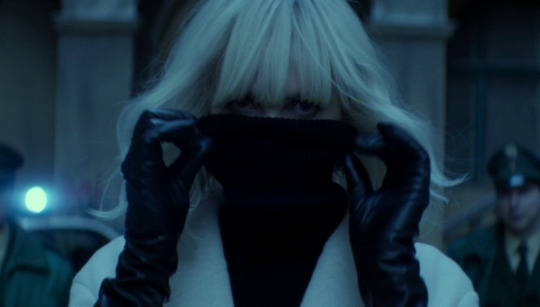

26th of Rova, 4716, Kintargo
The city is under martial law. The Dottari patrol the streets in groups of 10, heavily armed and armored. Arrests hit an all time high. Bridges and gates cannot be passed without signing the log and paying a tax. Random raids and searches terrorize the people. Her friends are captured while trying to liberate innocents. Lore Falco will tear it all down.

She begins as she always does: at the city library. A beautiful and ancient building with white stone pillars. She starts at the card catalog, looking under “Architecture.”
She searches, straining with all her will to stay on task and ONLY research the Holding House Prison of Kintargo. She is constantly teasted by interesting stories, projects completed or not, shady tales and deals, but she must stay on task.
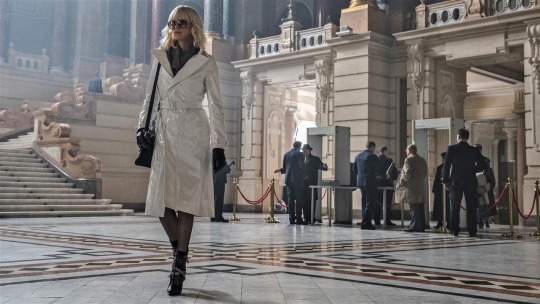
Her helper finds it. A very old soul in a young man’s body. He does not seem to know history, he remembers and retells it, slipping into first-person as he describes events a hundred years past.

He’s found the plans to building the Holding House. An ancient canvas blueprint, now framed under glass and bolted to the wall. She won’t steal it, won’t defile her sacred place, but she doesn’t have to. He stares at it for a few moments, says “Got it.” She replies “Lets go.” and they depart.
They change. From beige scholars to vibrant night owls. They drink, they eat, and they tell lies. He stays mostly silent, just there for the look. She does the talking, and he does the listening. He never forgets.
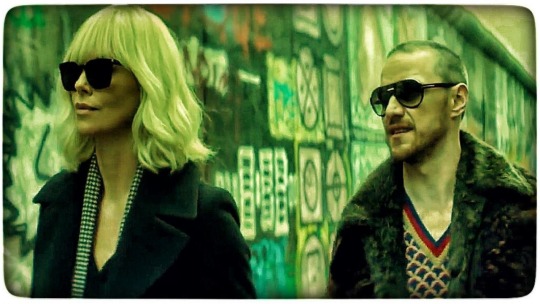
They learn a name, a guard captain who works at the Holding House named Durl Haggard. Ridiculous name. Now she must find him.
Normally she would take weeks. Slowly building a foundation of knowledge, but she knows her friends are inside. She knows it cannot be pleasant. She must find him tonight. She works his friends, through them she finds his hangouts and favorites.

They wait for Captain Haggard at home, in the dark and in silence. The target does not hear the spell that hits him, or even know he was attacked. Durl only knows that his long lost friend has come to visit him with an urgent plea for help.

She questions Durl through the charm spell. The old one draws a map of the Holding House from memory and together, the three of them mark it in great detail. She parries suspicion with strong wine. She buys trust with food. She and the old one learn everything they can about the facility from someone who has worked there for years.
Their capture is secured in the basement of the fire-damaged coffee house, now shut down for “Renovations and repairs.” They leave days of food, water, and more wine in the cell.

The old one and the bearded angel have gone to repay a favor to a powerful potential ally by freeing his friend under house arrest who is a famous poet banned by Thrune law.
So she is alone and back in the white stone library. Centuries of city and county records are piled in front of her. She churns through thousands of transactions, orders, requests, promotions, demotions, court-martial transcripts, transfers, and contracts.
She now knows what she needs. The Holding House does not use names, only numbers, but she knows them, all but one. Two of her three missing friends are confirmed as inmates, along with the four innocents they went there to liberate. She returns to her sanctuary and covers a long table in parchments, inks, stamps, and wax.

Transfer requests are formed and signed. Extra-duty forms are filled and signed to request extra guard escort from the Holding House to the Kintargo Opera house guard station. Release forms detail the prisoners serial numbers and bureaucratically absolve the Holding House staff from any responsibility for them after they leave the building. A commander’s seal and the official seal of Thrune are added where needed and all documents are properly stressed and aged slightly.
She gathers the resistance. She brings them all in on the plan to whatever degree is required.
The tengu and her scouts will spread the word of a large-scale march against the curfew and taxes that will take place in the guard district with the Holding House, occupying any potential reinforcements. The nobleman will lead the protest and work the crowd into a thundering riot at the appointed hour. Her enemies will be deaf.


She crafts Durl’s armor around her break-away breastplate, fashioning it to be a Dottari Captains well-worn uniform. Similar disguises are created for her friends. The old one and the bearded angel will be Dottari Corporals. Her enemies will be blind.

She empties the Silver Ravens rainy-day fund and secures numerous healing potions, collapsible weaponry she designs and builds herself, and a gas grenade loaded with sweetdream poison. Her enemies will be mute.
She changes. Pads her arms and shoulders, conceals her shape. She redesigns her body and posture to carry Durl’s armor as if she always has. Make-up, wig, and vocal mimicry learned during his four hour “interrogation” are honed and practiced. She becomes him.
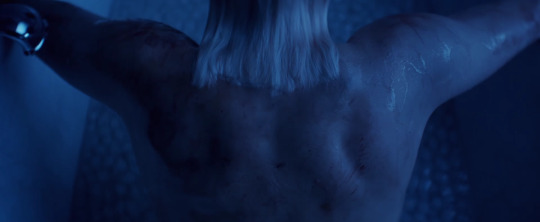
She assists her corporals into their uniforms and instructs them to keep their mouths shut no matter what occurs.
They approach the Holding House. A Dottari patrol rushes past them, at first only seeing the corporals they call out demanding assistance with a public disturbance by the Opera House.
She turns and checks them hard in the voice of Captain Haggard, clutching a heavy handful of paperwork. The Dottari apologize and scurry down the street. Some children carrying hastily-crafted protest signs nearly walk right into her and her corporals, but they scurry away, daring a rude gesture as they go.

She bullies the outer sentry. Checkmates the desk sergeant. She cons the Hellknight into letting her team into the cell block. The block sentries help her find the cell keys. She makes them hold her extra paperwork while she looks in every cell to verify her prisoners are present and alive.
Her corporals hold together, only just. They witness atrocities. The prisoners are being systematically tortured nearly to the point of death, and then healed back to life. It’s happening daily and constantly. With a glance, she checks with her team to confirm that they want to go to plan b. They go to plan b.
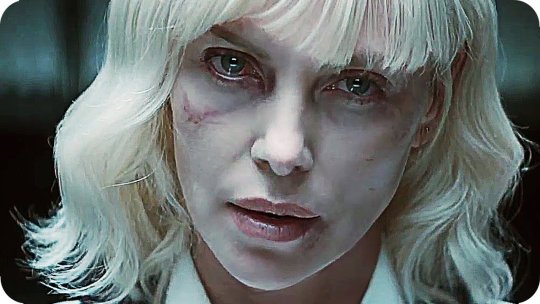
She demands manacles and chains for seven and the sentries comply and leave to fetch them from the equipment room. With only two guards left in the block, the old one drops them both with a sleep spell. They begin opening cells.
She finds her three lost friends, and the four friendly hellknights they originally meant to rescue. She learns why her prisoner number list was missing one. While the dancer and soldier were captured, the kensai has evaded the guards using spells and guile for nearly three days. The team is united.


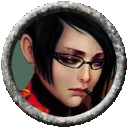
She also finds a bartender, a blacksmith, a gambler, and many other civilians. They free everyone and hold the cell block for over two minutes while they prepare to leave.
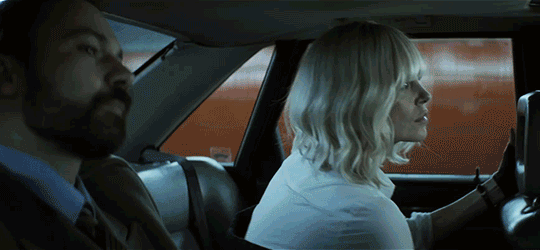
She draws dozens of parts from her armor and assembles a portable greatsword, scimitar, katana, and fauchard. She hands out potions of healing and air-bubble to avoid breathing the sweetdream grenade if they use it. She picks any locks she has not stolen the key for.
The guards she sent on an errand return to an ambush. One is instantly gutted by the bearded angel using the greatsword she gave him. The other turns to run.
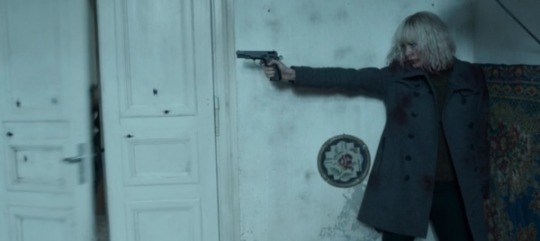
She drops the cloak from her shoulders, slides around a pillar to gain a clear view of his back, and hurls two of her silver daggers She lands one in the back of his neck and one through his lung. He falls over his colleague and blood is soon seeping into the floor-drains of the cell block.
She and her team hears tales of torment, and a soundproof room in the corner of the Holding House used to gain information for Thrune. She picks her team and they kick the door.
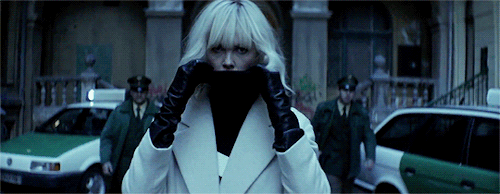
They battle a foul devil of hell, the master interrogator. After defeating her, they turn their attention on the Holding House office and it’s cabinets of confiscated items.

She and the kensai silently carry out armloads of armor, weapons, and other gear. The warden and front desk are left undisturbed.
They see to their prisoners as best they can with the supplies she brought. With all of them more or less on their feet, they fight their way out the front door. There is a brief scuffle with the desk sergeant and hellknight. They hear marching feet and a thundering crowd nearby.

She disassembles her Dottari disguise and instructs her corporals to do the same. They burn the uniforms and destroy what evidence they can as they clean out the Holding House guard storage lockers, finding more healing items they carry with them.
She approaches the outer door and throws them open to find the nobleman with 800 angry citizens at his back. A crowd instantly surrounds them as they exit the Holding House. Every former prisoner is taken by the hand, shrouded in a cloak, and given a protest sign as they merge into the march flowing past. They stay with the crowd for a block until they divert into a friendly bar marked “Closed.”

Inside they find a hot meal, wine, and water for 10 waiting for them. She nods to the owner in thanks and the owner replies “I love it when a plan comes together.”
After every freed prisoner is found a warm bed to sleep in and all extra tools and evidence are stored or destroyed, she finally relaxes with a drink and a bath, wondering what her next project might be.

2 notes
·
View notes
Text
READ BETWEEN THE LINES of Episode 7x06
So this is my first post and my first answer to anything, I’m more of a silent observer but the latest episode had me on the verge of angry tears, because it just seemed so fucked up. It was like D&D systematically destroyed beloved characters I got attached to over the last 7 season of game of thrones. And since being an librarian and book lover I can’t let that happen uncommented.
So I came on to check the Jonsa tag and found this little piece about how Jon might be playing Dany and even if I am not agreeing to everything in it, I think marydri in onto something here.
I was surprised how much conversation between the characters actually took place during the episode, when it actually seemed to be more action laden. So I took the time to see through the conversation especially Jon was involved, especially with the members of the Suicide Squad.
Tormund, reminding him that pride gets people killed, implying he should bend the knee. Dany said to him that he should lay aside his pride and bend the knee, he himself said it to the king beyond the wall, and I think when Tormund is telling him the exact same thing, he starts to accept that it might be his only choice.
Beric saying that he and Jon won’t find much joy in this life but they can keep others alive, they can protect the ones who can’t protect themselves. Not serving a woman he barely knows sitting on a throne made of swords, but fighting for life. I am the shield that guards the realms of man. Jon agrees to that and what has he more to protect than his family? His siblings in Winterfell, the Wildling who are sworn to him. It’s not for this queen he is fighting for, but the people he swore to protect, that including Sansa.
I remember after I saw the episode I was so angry at Jon for leaving Sansa behind in danger, with Littlefinger lurking around every corner, and now bending the knee just because he seems like he wants to get laid. Swears to a queen he knows for three episodes. I agree it’s all to rushed.
But then I thought about, that this whole episode just felt wrong, all the tension between Arya and Sansa, it just didn’t make sense. But then I thought maybe the big theme of the episode was fraud. I think Arya and Sansa are playing Littlefinger. They know he has spies everywhere. Arya saw him lurking in dark corners with them, also with the Maester.
The Sansa Arya fight about her letter and betraying her father takes place the open not in a private room. Everyone could overhear that. The message the Maester gives her from kings landing and the following dialoque is also in the open not a private room. Then Sansa summons Littlefinger and seems to seek help from him because of Aryas spying but what she really does is using Littlefinger to make her own lie more believable. He gives her the one clue that would make her appear even more volnurable for his attacks and that is Brienne. By mentioning that Brienne would sense that Arya wants to harm her, he actually gives away that he himself fears her. He is afraid that Brienne could interfere his own plot. Sansa realizes this and gets rid of Brienne with fake Raven. Says it’s an invitation to kings landing to the Maester who could be Littlefingers spy, because he helped finding her letter from ages ago, and brought it to him.
She also burns the letter after she tells Brienne to go to Kings Landing, so nobody will ever know if the letter was real or not. The conversation with Brienne takes also place not in a private room. She even picks a fight with Brienne to make her bluff more convincing and let Littlefinger think that she is sending away her only protection against his plots. Also the door behind Brienne is wide open. Perfect to spy on them.
So maybe the reason this episode feels so wrong could be because it’s all a fraud, even Jons knee bending. He needs to, in order to protect Winterfell and his family.
He sees Viserion fall and he can’t be that stupid as not to predict what comes next, especially after encountering the White Walker polar bear. He should know his enemy good enough by now. What is going through his mind, when he sees Viserion fall is not his guilt over loosing Danys Dragon, but giving the night king a possibility to win for good. His only chance are the two dragons he has left, and he needs to keep them and Daenerys as an ally on every cost.
Also I noticed that the Night King walks through fire unharmed. And he kills dragon with ice that goes through the Dragon like butter unlike Bronns Scorpion Arrow. That means the door swings both ways. Ice and Fire negate each other. Fire kills walkers, ice kills dragon. But the fire does not harm the knight king because he is immune to fire? Because he is a Targaryean?
Also I noticed the touch of hands. The moment Jon shares with Dany. We didn’t see much physical contact with Jon involved except from Sansa, and everytime she touched his hand he stoped and looked at the joined hands, like in disbelieve that someone touched him. So this could only be my Jonsa heart but I thought maybe when he touches Danys hand he remembered Sansa.
So what about the distant stare in the end of the “My queen” scene? Could be guilt. A look of shame for playing Dany and realizing that she really feels for him?
I mean he must be blind to see the heart eyes coming his way. But it always seemed to be at least one sided until the hand touching. I don’t know, it could also be real affection for Dany. Maybe an affection of the blood. And they mistake it and try to give it a form, a form they know, like a romance.
Could also be that Kit Harington is a bad actor and stares blunt into nothingness when he tries to be romantic, but he wasn’t with Ygritte and he shows emotion with Sansa. Could be, this is because he is good mates with Sophie Turner and Rose Lesie is his girlfriend. Could be he can’t suppress real life emotion and act love. A lot of could be. I am trying not to get my ship sailed to much in fear of rejection here.
Whatever it might be and if Jonsa is endgame or not, one thing is clear. Jonaerys won’t last long, maybe just for the Boatsex and then Jon will stop at nothing to protect his family and those sworn to him. That means Winterfell, that means Sansa.
But ( and yes I know what this means, but hear me out)
I also think the Boatsex will have the consequence of a child. Why, because of 7x06 conversations.
Jorah mentions that Jon could give his sword to his children.
Daenerys saying that the dragons will be the only children she will ever have.
Tyrion being concerned about who sits on the Iron thrown after Daenerys. Also mentions that she can’t have children and should choose a successor.
Three conversations about children and successors in one episode !
I think only a Targaryen can spawn a Targaryen. Like it was for centuries before, and Danys child will sit on the Iron thrown, after her while Jon is dying a heros death, again, in order to protect his real family, the Starks of Winterfell.
And last but not least. Did anyone notice Jons wounds? They seem like the don’t heal so well. Any thoughts on that?
And I’m out lol sorry for any misspellings, English is not my first language ;)
�G��_�v;F�B%-
3 notes
·
View notes